Ireland and The United Nations – a Month in Review
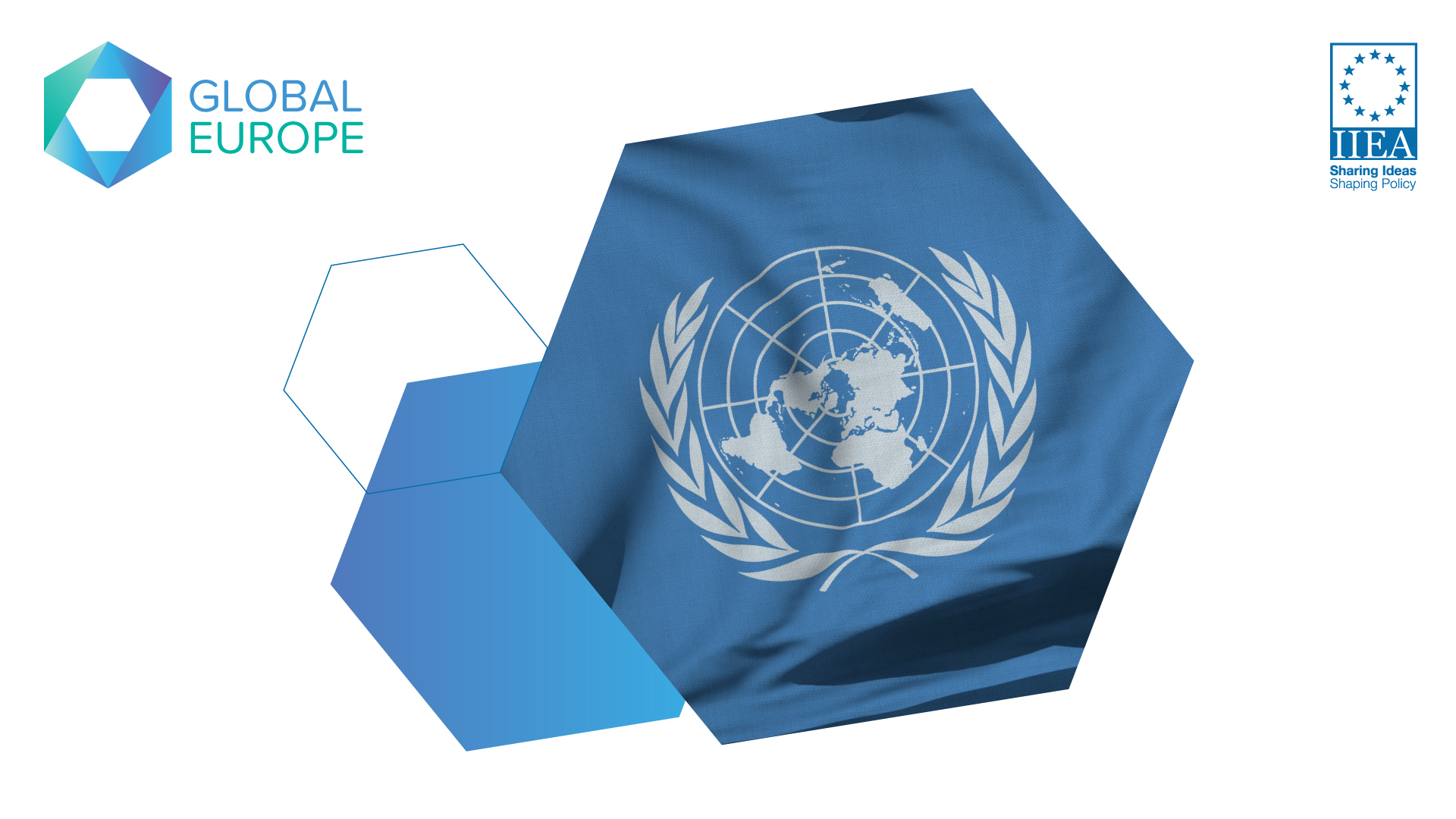
This review will provide an overview and analysis of last month’s activities across the United Nations system, from New York to Geneva.
July 2023
This month’s review includes updates from an Irish perspective on key developments at the UN General Assembly, the Security Council, the United Nations Economic and Social Council, and the UN Secretariat.
Leaders of Today: Ireland’s UN Youth Delegates Call for Meaningful Inclusion of Youth
In July 2023, Ireland presented its second Voluntary National Review (VNR) of the Sustainable Development Goals to the UN High-Level Political Forum on Sustainable Development. The VNR is a voluntary, country-led review, through which countries can assess and present their national progress towards achieving the 2030 Agenda for Sustainable Development, and the 17 Sustainable Development Goals. Ireland’s 2023 VNR report was developed around the theme of 'Building Back Better while Leaving No One Behind' and reflects Ireland’s strong economic recovery following the pandemic and demonstrates the wide range of national policies which continue to be introduced to support and address the SDGs and their targets.
In January and April 2023, National Stakeholder Fora were held in Ireland, to promote meaningful engagement with civil society and youth representatives, as a result Irish civil society stakeholders contributed chapters to Ireland’s VNR. The youth consultation process, and the resulting youth chapter, were an integral part of Ireland’s VNR in 2023. This is particularly notable as it represents the first time that a standalone youth chapter has been included in any country’s VNR. Chapter 5 of Ireland’s VNR sets out the outputs of the youth consultation process, led and written by Ireland’s UN Youth Delegates, David Giles and Jessica Gill.
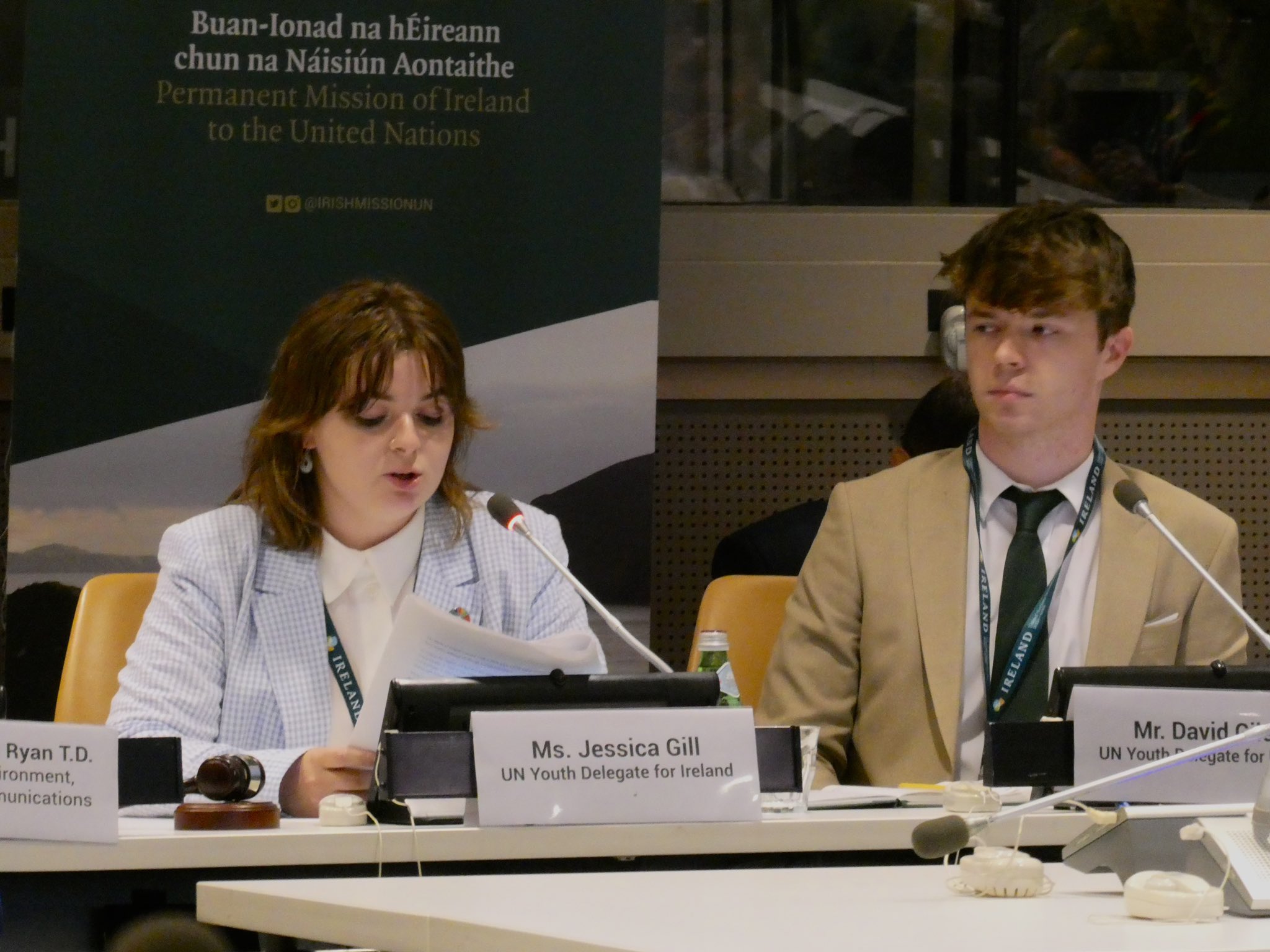
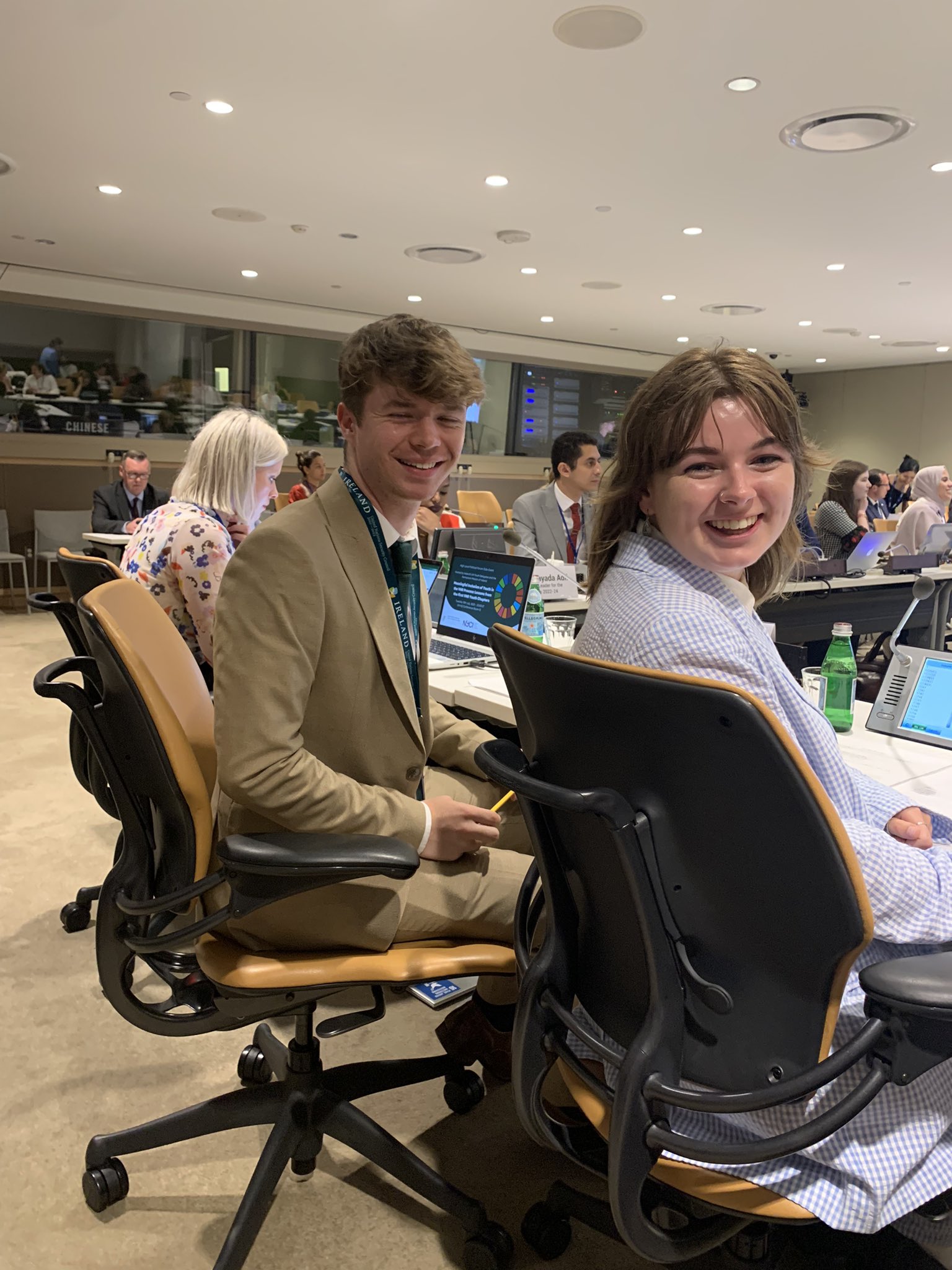
Ireland’s UN Youth Delegates: Jessica Gill and David Giles
Ireland’s UN Youth Delegates also organised a High-Level Political Forum side-event entitled ‘Meaningful Inclusion of Youth in the VNR Process: Lessons from the First VNR Youth Chapters’. The event provided practical advice for all interested Member States on facilitating a youth chapter in their future VNRs. The UN Youth Delegates from Ireland shared their experiences of writing a VNR Youth chapter, including what their priorities were, the methodologies they utilised, and the lessons learnt in the process.
A panel of international youth inclusion experts provided insights into the best practices in meaningfully including the voice of young people in multilateral processes. The event marked a significant advancement in the empowerment of young people to participate in SDG accountability processes.
Ireland, having played a significant role in the development and adoption of the 2030 Agenda, is now leading consultations on the Political Declaration of the Sustainable Development Goals (SDGs) Summit which is taking place in September 2023 in New York. By facilitating the creation of one of the first VNR youth chapters, Ireland is once again showing leadership by highlighting that youth participation is critical for the successful implementation of the 2030 Agenda and for achieving sustainable development for all.
United Nations Security Council – July 2023
The United Nations Security Council is one of the six principal organs of the United Nations and holds the primary responsibility for maintaining international peace and security.
- In July 2023, the United Kingdom took the Presidency of the UN Security Council. Under the UK’s Presidency, the Security Council’s programme for July 2023 featured its first-ever discussion on Artificial Intelligence (AI). High-level meetings were also held on Ukraine and on conflict-related sexual violence.
- On 11 July 2023, the UN Security Council failed to reauthorise the cross-border mechanism for the delivery of humanitarian aid into Syria. The first draft of the resolution, submitted by Brazil and Switzerland, would have extended use of the Bab al-Hawa crossing for another nine months, but was rejected owing to the veto cast by the Russian Federation in a vote that had otherwise garnered 13 votes in favour, with 1 abstention from China. Tánaiste Micheál Martin expressed deep concern over the UN Security Council decision. He recalled that Ireland and Norway worked tirelessly during Ireland’s recent term as an elected member of the Security Council to renew the cross-border resolution, both in 2021 and 2022. The Tánaiste urged the Security Council to find a solution quickly as the humanitarian assistance to the 4.1 million people who depend on it must continue.
The General Assembly of the United Nations – July 2023
The UN General Assembly (UNGA) is the main policy-making organ of the Organisation. Comprising all Member States, it provides a unique forum for multilateral discussion of the full spectrum of international issues covered by the Charter of the United Nations.
- On 19 July 2023, the UN General Assembly convened to debate the Russian Federation’s 11 July 2023 veto of a Security Council draft resolution that would have authorised a nine-month renewal of cross-border aid‑delivery to northern Syria. Ireland, aligning with the European Union, stated that the survival of the people of Syria ‘hangs in the balance because of the reckless and irresponsible actions of the Russian Federation’. Criticising the Russian Federation’s use of its veto, Ireland emphasised that the longer reform is postponed, the more we risk further undermining the credibility of the Security Council as the guarantor of international peace and security.
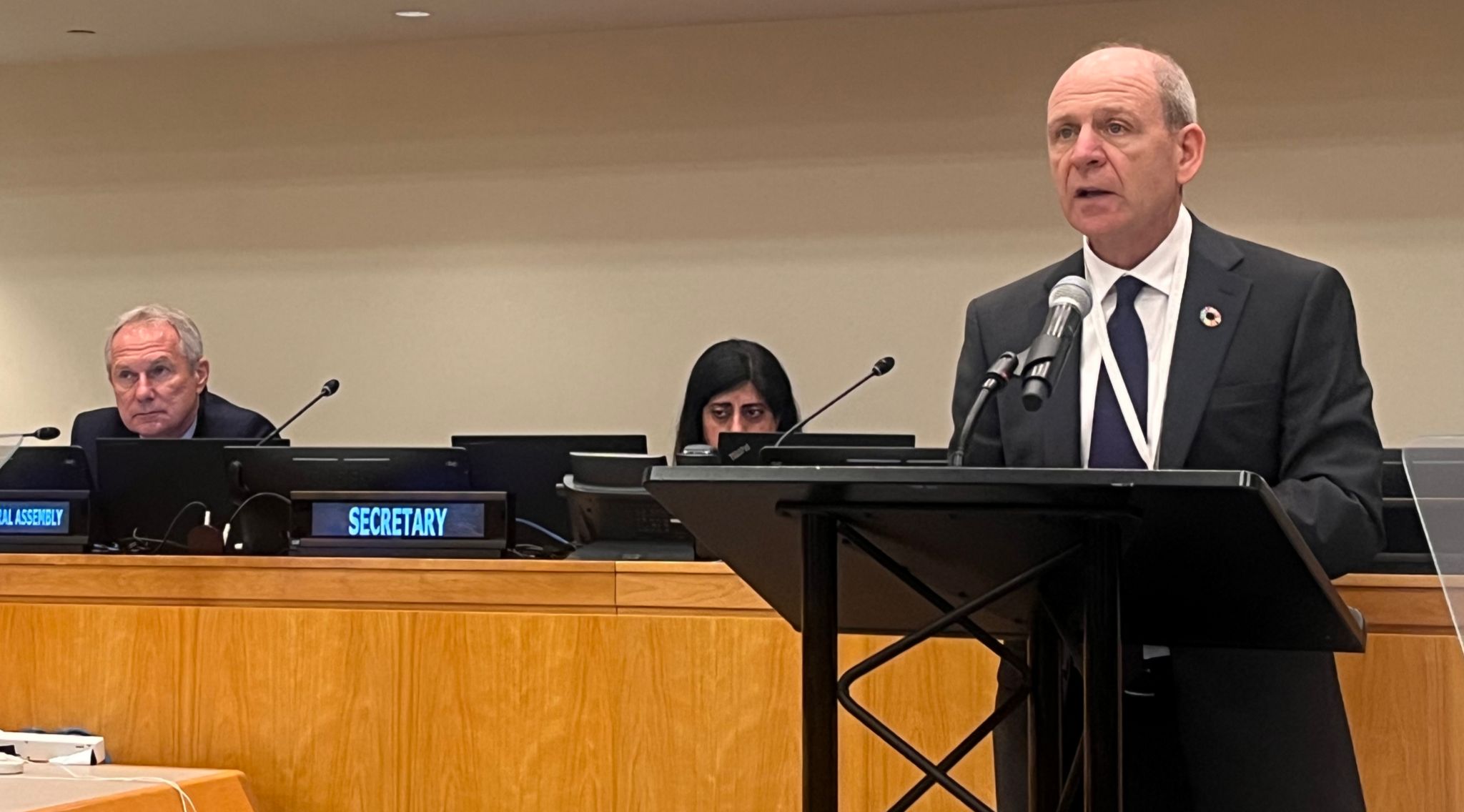
Ambassador Fergal Mythen, Ireland's Permanent Representative to the United Nations
- On 25 July 2023, the General Assembly adopted three consensus decisions on global health and foreign policy, namely on upcoming high-level meetings on universal health coverage, the fight against tuberculosis, and on pandemic prevention, preparedness, and response. The General Assembly adopted another three consensus resolutions on the strengthening of the United Nations system, the impact of rapid technological change on the Sustainable Development Goals, and culture of peace.
United Nations Economic and Social Council – July 2023
The United Nations Economic and Social Council is one of the six principal organs of the United Nations, responsible for coordinating the economic and social fields of the organisation.
· The High-level Political Forum on Sustainable Development (HLPF) was held from Monday, 10 July, to Wednesday, 19 July 2023, under the auspices of the UN Economic and Social Council (ECOSOC). This included the three-day ministerial segment of the forum from Monday, 17 July, to Wednesday, 19 July 2023. The last day of the High-level Segment of ECOSOC was on Thursday, 20 July 2023. The HLPF also supported the mid-term review of the implementation of the SDGs and the preparations for the 2023 SDG Summit – the HLPF to be convened under the auspices of the General Assembly in September 2023. During the HLPF, Minister for the Environment, Climate, Communications and Transport, Eamonn Ryan presented Ireland’s VNR of its implementation of the 2030 Agenda, alongside 38 other members states.
The United Nations Secretariat – July 2023
The Secretariat is the organ that administers and coordinates the activities of the United Nations. It services the other main organs of the UN and carries out the programmes and policies laid down by them. The Secretariat is headed by the Secretary-General, who is appointed by the General Assembly and provides overall administrative guidance.
- On 17 July 2023, the UN Secretary-General, made a statement in response to the decision by the Russian Federation to terminate the implementation of the Black Sea Initiative. In April 2022, the Secretary-General met with Russian President, Vladimir Putin, and with Ukrainian President, Volodymyr Zelenskyy, to propose the plan. The plan was ultimately negotiated in July 2022 between Turkey, the UN and Russia as a way of ensuring that Ukraine, one of the ‘breadbaskets of the world’, could ensure that its grain could leave its southern ports via the Bosphorus. The Secretary General said that the Russian Federation’s decision to terminate the Black Sea Initiative will ‘strike a blow’ to people in need everywhere. The Tánaiste and Minister of Foreign Affairs, Micheál Martin TD, also lamented Russia’s decision to withdraw its support for the deal.
- The UN Food Systems Summit+2 Stocktaking Moment (UNFSS+2) convened by the UN Secretary-General and hosted by the Government of Italy took place at FAO Headquarters in Rome from 24-26 July 2023. The high-level event brought together close to 2000 participants in-person, from 161 countries, including 22 Heads of State and Government, more than 100 Ministerial delegates, and over 150 Non-State-Actor organisations as well as representatives from the UN System and other International Organizations. Ireland’s Permanent Representative to the United Nations Agencies based in Rome, Ambassador Patricia O’Brien, met Deputy Secretary-General of the United Nations, Amina J. Mohammed, on the margins of the summit to discuss Ireland's continuing commitment to enhancing global food systems. Giving a statement, Brendan Gleeson, Secretary General of Ireland’s Department of Agriculture, Food and the Marine, said that, “Ireland’s experience is that food systems transformation is not easy, and difficult discussion are required, but this underscores the vital importance of collaboration and partnership with all stakeholders to make meaningful progress.”
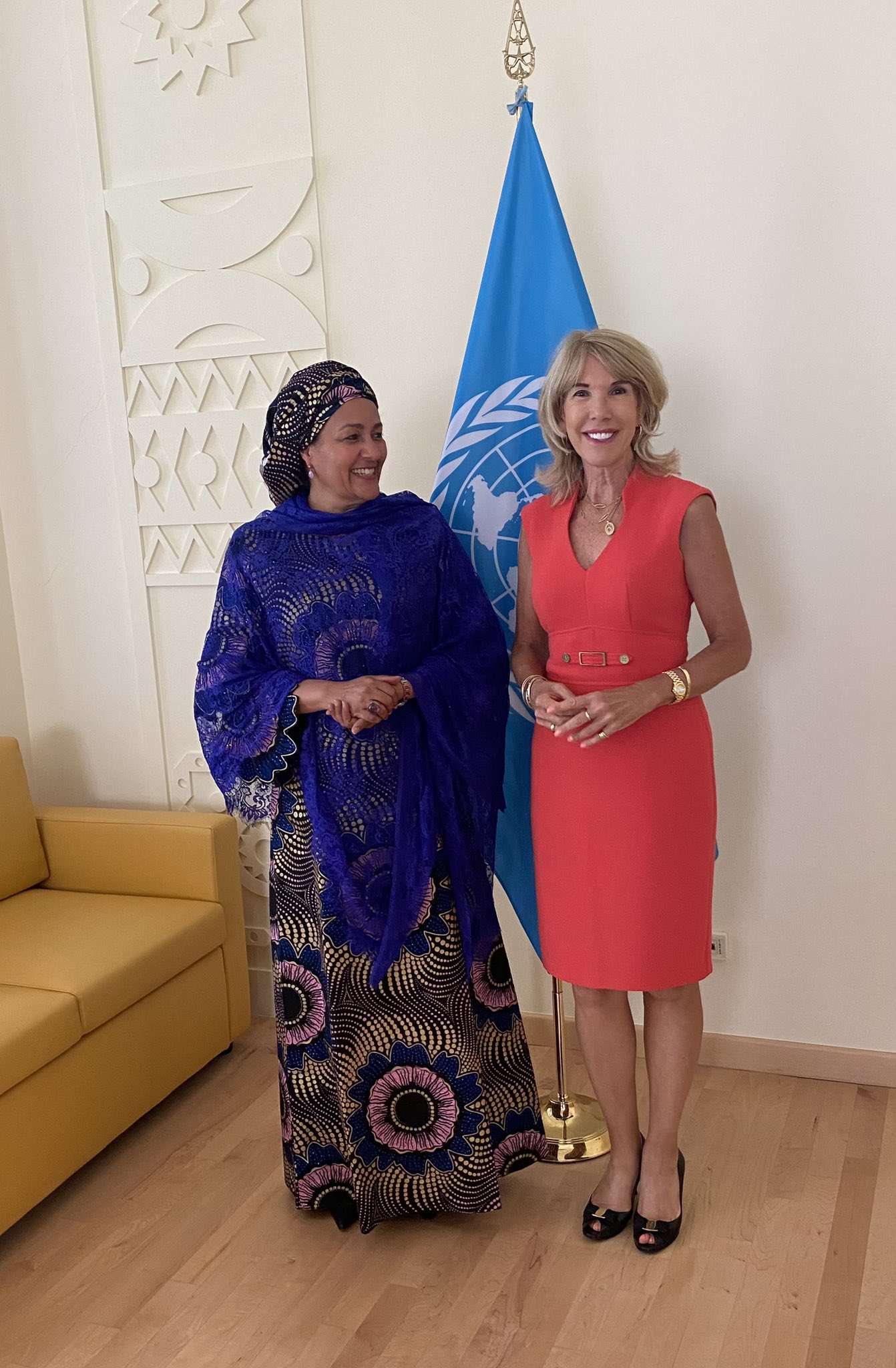
Amina J. Mohammed, Deputy Secretary-General of the United Nations and Ambassador Patricia O’Brien
June 2023
This month’s review includes updates from an Irish perspective on key developments at the UN General Assembly, the Security Council, the UN Department of Economic and Social Affairs, and the UN Department of Peace Operations.
Celebrating the 75th anniversary of the Universal Declaration of Human Rights with Young Human Rights Defenders
In 2023, the Office of the UN High Commissioner for Human Rights is running a year-long initiative, the Human Rights 75 Initiative, which is commemorating the 75th anniversary of the Universal Declaration of Human Rights.
As part of this initiative a high-level symposium entitled, ‘Vienna World Conference 30 Years On: Our Rights – Our Future’, was held from 5 to 8 June 2023 commemorating the 30th anniversary of the World Conference on Human Rights, which took place in Vienna in 1993 and paved the way for the creation of the UN Human Rights Office. Building on the Universal Declaration of Human Rights (UDHR) of 1948, the World Conference in 1993 affirmed the universality and indivisibility of human rights. The 1993 Conference‘s main outcome document was the Vienna Declaration and Programme of Action (VDPA). At the high-level symposium human rights stakeholders from diverse backgrounds discussed current and future challenges as well as best practices in the promotion and protection of human rights.
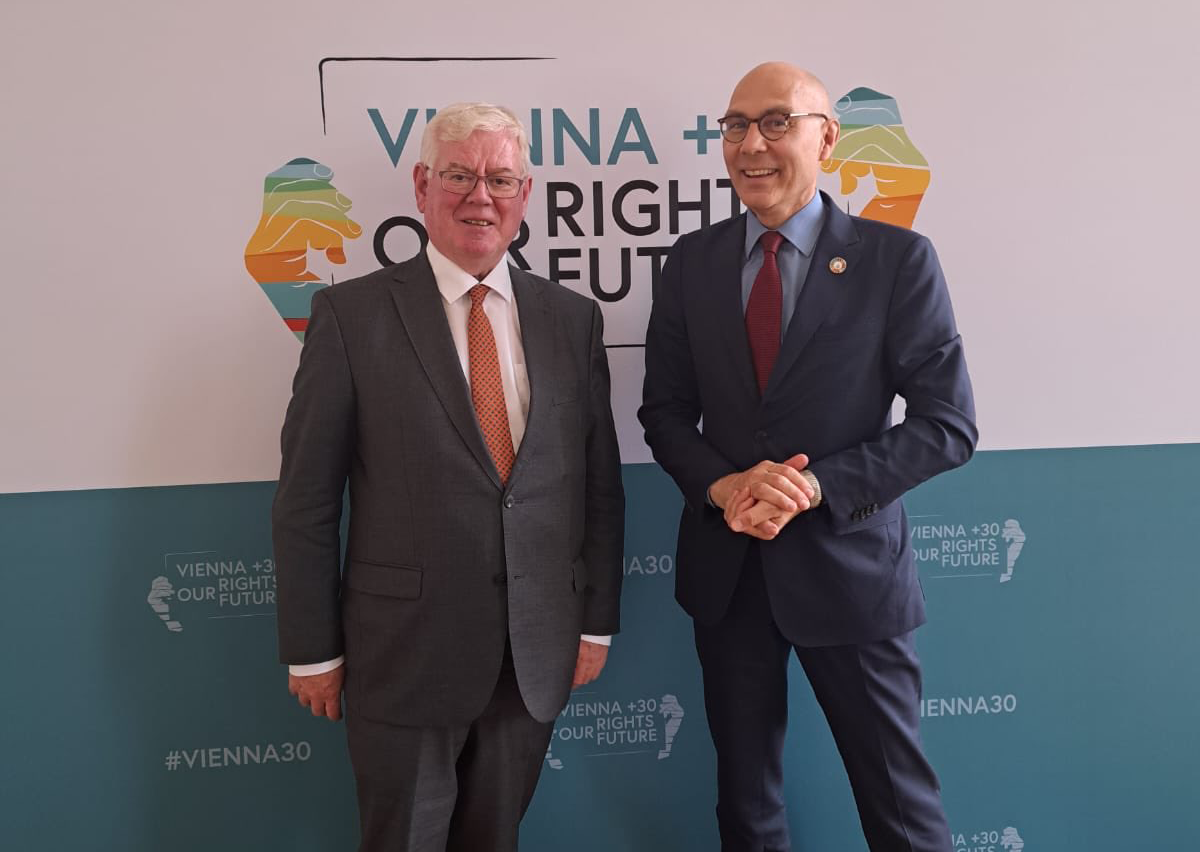
Eamon Gilmore, EU Special Representative for Human Rights, also participated in the symposium, speaking on a panel on the topic of the universality and impartiality of Human Rights.
As part of the symposium, the Vienna Youth Human Rights Defenders Conference took place, during which Mary Lawlor, United Nations Special Rapporteur on human rights defenders, hosted 40 youth human rights defenders between the ages of 12 and 32, who met to discuss and address themes such as climate change, bullying, and LGBTIQ+ issues. During group sessions the participants shared their experiences and strategies and reported back to their peers building a broad picture of the situation for young human rights defenders across different regions. Mary Lawlor reported that she learned a lot from the youth human rights defenders and stated that the situation of young human rights defenders will remain a priority for her office over the course of her mandate, and she indicated that she intends to dedicate an upcoming thematic report to their role, their work and the risks they face.
Given that young people face particular challenges in exercising their rights while often being at the forefront of human rights activism, youth engagement is a key component of the Human Rights 75 Initiative.
To ensure meaningful engagement with youth, the Office of the High Commissioner for Human Rights has established a Youth Advisory Group, with the objective to ensure integration of youth perspectives into the activities of the Human Rights 75 initiative; to help promote the Human Rights 75 initiative among young people worldwide, and to ensure that young people have a voice in the development of human rights commitments for the future.
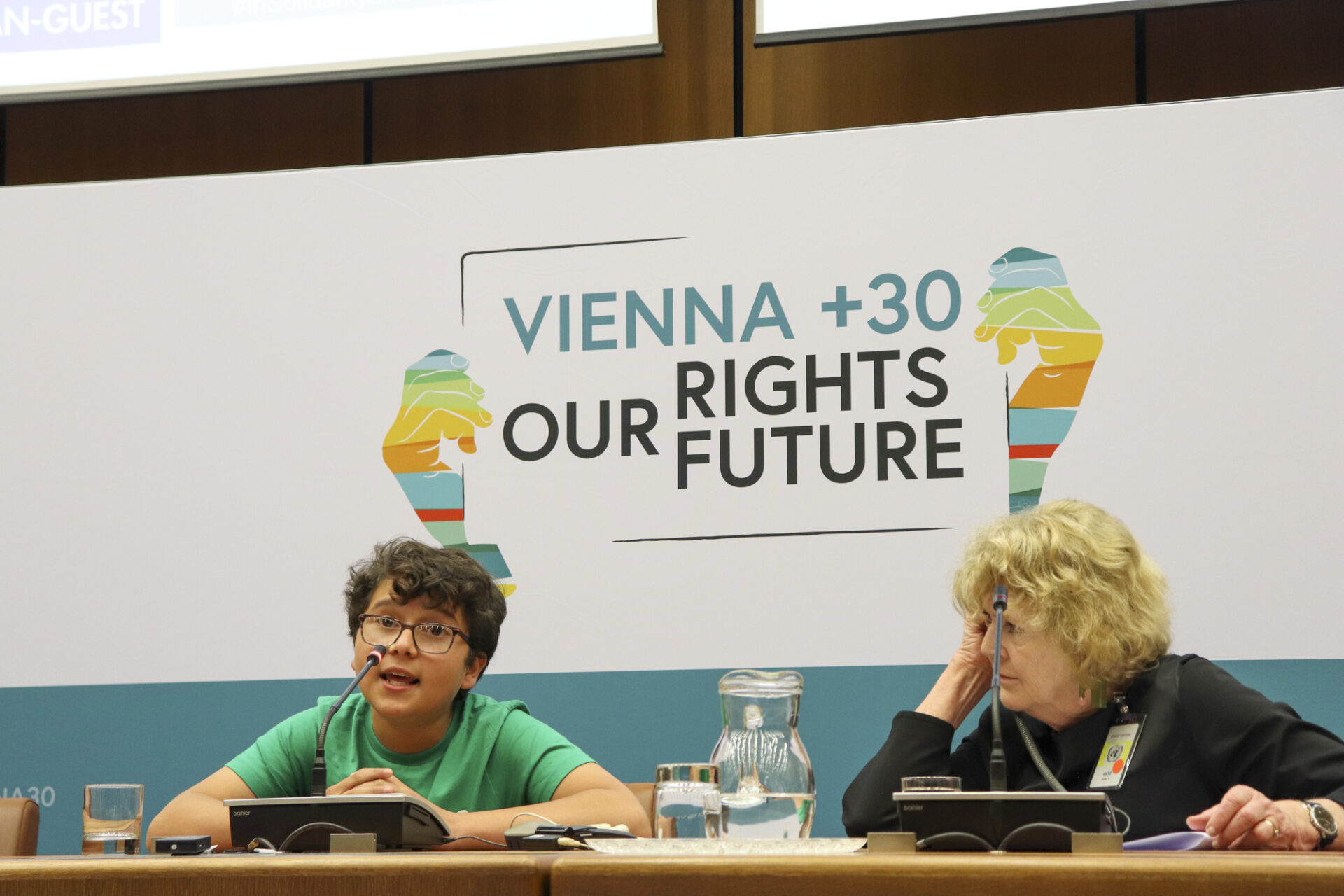
A Youth Human Rights Defender and Mary Lawlor, UN Special Rapporteur on Human Rights Defenders
To listen to our recent podcast interview with Mary Lawlor, UN Special Rapporteur on Human Rights Defenders, click here.
United Nations Security Council – June 2023
The United Nations Security Council is one of the six principal organs of the United Nations and holds the primary responsibility for maintaining international peace and security.
- The United Arab Emirates held the rotating presidency of the UN Security Council for June 2023. The UAE held three signature events throughout the month. A briefing took place on 8 June 2023, which identified pathways to increased UN and League of Arab States collaboration, and addressed regional crises, and reinforcing partnerships for promoting the inclusion of women and girls. A ministerial open debate was held on 13 June 2023, which focused on strengthening consensus among Council members on the impacts of climate change on peace and security. A ministerial briefing was also held on 14 June 2023, which considered the holistic strategies that UN Member States can take to promote social cohesion and the values of human fraternity throughout the peace continuum: from conflict prevention to conflict resolution and peacebuilding.
- On 6 June 2023, the UN General Assembly elected Algeria, Guyana, Republic of Korea, Sierra Leone and Slovenia to the UN Security Council for the period of 2024-2025.
- On 13 June 2023, the UN Security Council hosted an Open Debate on climate change, peace and security. Ireland addressed the Council and called for a multilateral response to these issues. Ireland stated that, ‘the question of whether the Security Council should factor the security risks of climate change into its decision-making is no longer a matter of if, but when.’
UN Department of Peace Operations – June 2023
The Department of Peace Operations provides political and executive direction to UN peacekeeping operations around the world and maintains contact with the Security Council, troop and financial contributors, and parties to the conflict in the implementation of Security Council mandates.
- On 25-26 June 2023, the Preparatory Conference on Women in Peacekeeping Operations, was co-hosted by Bangladesh, Canada and Uruguay in Dhaka. The theme of the meeting was Women in UN Peacekeeping. Representatives from the UN troop- and police-contributing countries, and peacekeeping experts convened to discuss progress, challenges and good practices on increasing women’s meaningful participation in UN peacekeeping. This conference took place in advance of the Peacekeeping Ministerial, which will be hosted by Ghana in Accra on 5-6 December 2023.
UN Department of Economic and Social Affairs – June 2023
The UN Department of Economic and Social Affairs (UN DESA) is part of the United Nations Secretariat and is responsible for the follow-up to major UN Summits and Conferences, as well as services to the UN Economic and Social Council and the Second and Third Committees of the UN General Assembly.
- On 7 and 9 June 2023, the UN Department of Economic and Social Affairs (DESA), in collaboration with the UN SDG Action Campaign, convened a virtual informal stakeholder dialogue, during which stakeholders offered inputs to the zero draft political declaration for the September 2023 SDG Summit. The co-facilitators for consultations on the political declaration of the SDG Summit – the Permanent Representatives of Ireland and Qatar – circulated the draft on 8 May 2023. Over 1500 participants from more than 140 countries registered for the informal dialogue. Co-Facilitator Fergal Mythen, Permanent Representative of Ireland to the UN, stressed the need for the political declaration to be clear and accessible; capture “the spirit of ambition”; inject realism, urgency, and hope in government efforts to implement the Goals; and get the SDGs back on track “for everyone, everywhere, all at once.”
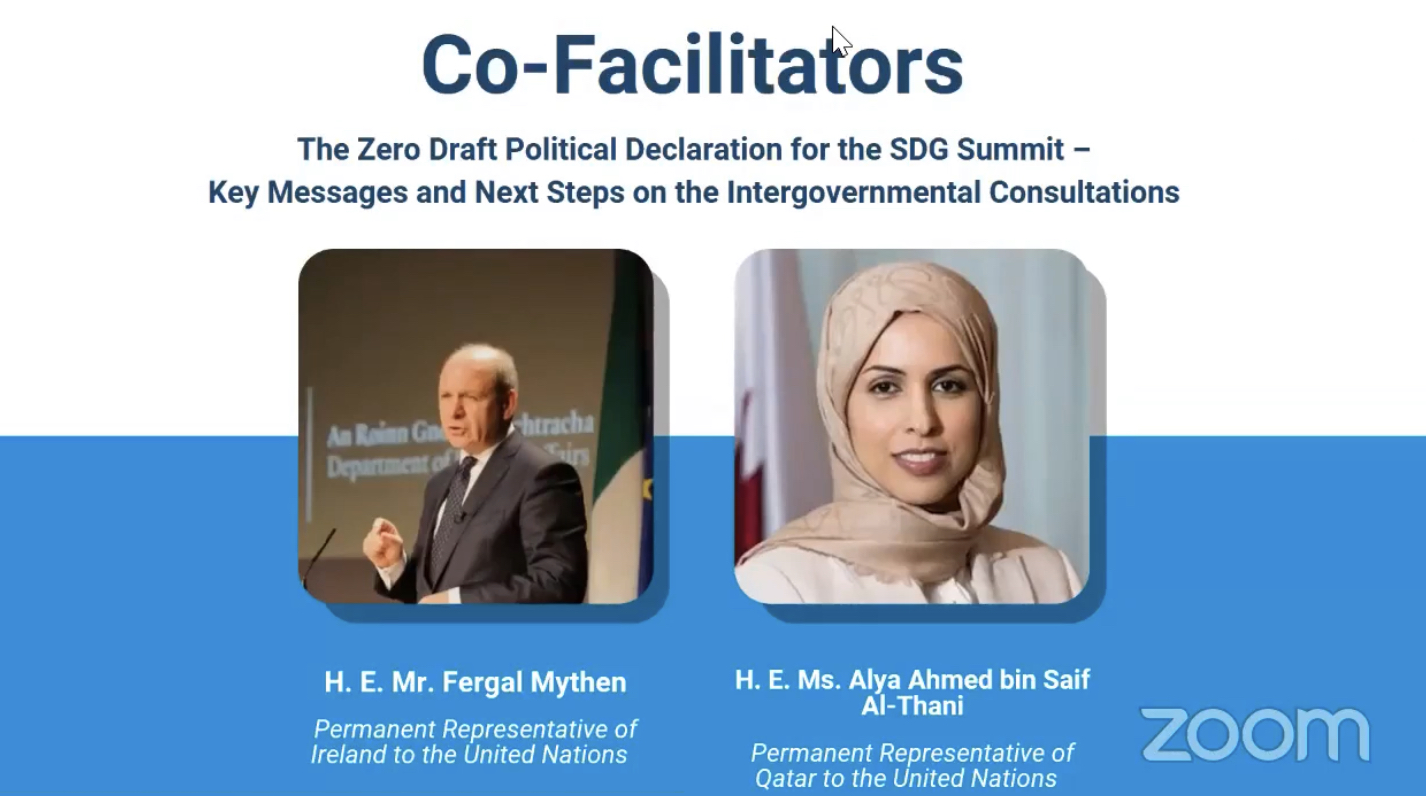
- In June 2023, the 16th session of the Conference of States Parties (COSP16) to the United Nations Convention on the Rights of Persons with Disabilities (CRPD) took place at the United Nations Headquarters, New York. The Conference of State Parties is an annual event during which participants discuss the implementation of the UN CRPD. Participants include representatives of the State Parties to the Convention, civil society organisations and disability rights experts. The themes of the session were ensuring access to sexual and reproductive health and services; digital accessibility; and reaching underrepresented groups. Gerard Quinn, UN Special Rapporteur on the rights of persons with disabilities, gave opening remarks, referencing a report that he published two years ago which focused on the balance of risks and opportunities posed by Artificial Intelligence for persons with disabilities, describing it as the “issue of our times”. He went on to state that AI can contribute to refreshing our social service and care models but warned that machine-based decisions can be by side-stepping the obligation of ‘reasonable accommodation.’ He stressed that once that core obligation is side-stepped then the advances in international equality law, which have been hard fought for, ‘are simply neutralised’. On 13 June Ireland hosted a side-event with the United Nations Partnership on the Rights of Persons with Disabilities (UNPRPD) where the importance of ensuring disability-inclusive funding for countries as they implement the Convention on the Rights of Persons with Disabilities was discussed.
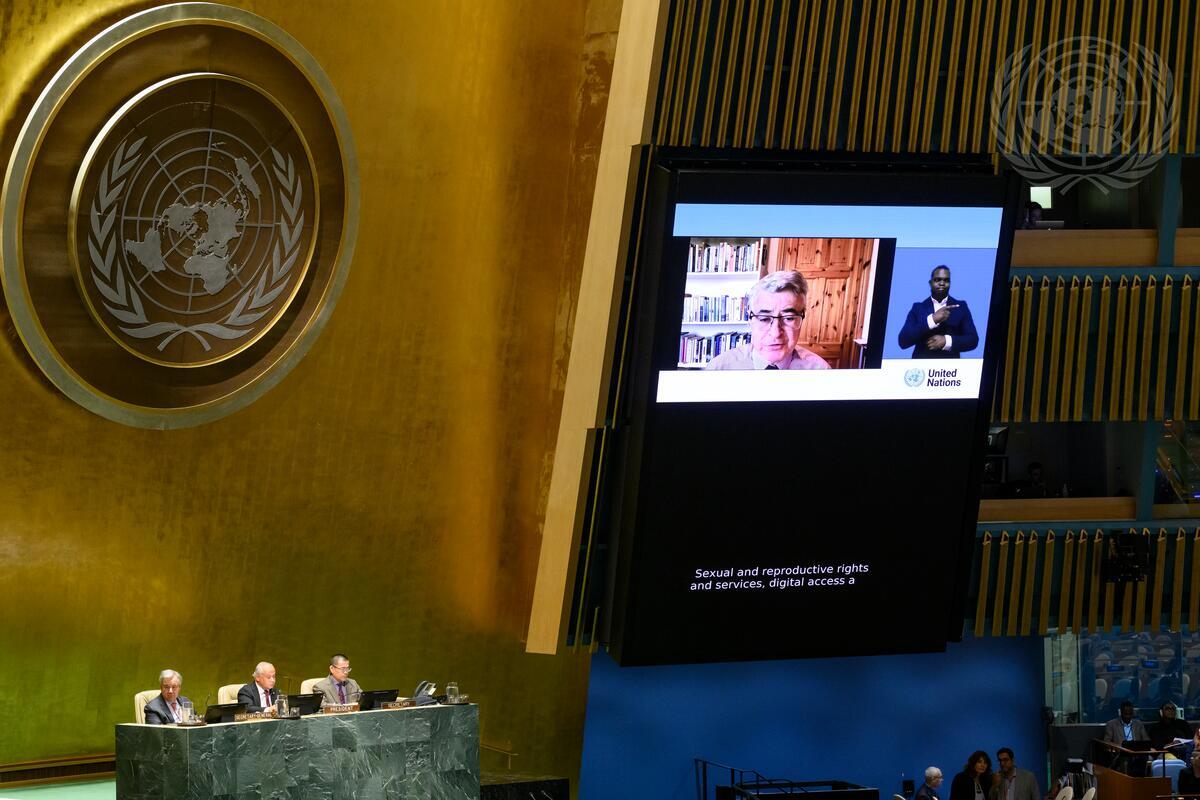
Gerard Quinn, the UN Special Rapporteur on the rights of persons with disability addressing the 16th Conference of States Parties
The General Assembly of the United Nations – May 2023
The UN General Assembly (UNGA) is the main policy-making organ of the Organisation. Comprising all Member States, it provides a unique forum for multilateral discussion of the full spectrum of international issues covered by the Charter of the United Nations.
- On 19 June 2023, the Intergovernmental Conference on Marine Biodiversity of Areas Beyond National Jurisdiction adopted a historic maritime biodiversity treaty. The text, as an international legally binding instrument under the 1982 United Nations Convention on the Law of the Sea, aims to ensure the conservation and sustainable use of marine biological diversity of areas beyond national jurisdiction. The UN Secretary General, António Guterres, addressed the Conference, stating that the adopted demonstrated that ‘global threats deserve global action’. He urged all States to sign and ratify the agreement without delay. The agreement has been welcomed as a “landmark” deal by Tánaiste and Minister for Foreign Affairs, Micheál Martin.
- On 14 June 2023, the General Assembly adopted two resolutions; the first of which is entitled ‘Follow-up to the Declaration and Programme of Action on a Culture of Peace’ and stressed the importance of addressing the underlying drivers of violence and conflict to promote a culture of peace. The text of the resolution encourages Member States, United Nations entities and relevant stakeholders to consider instituting mechanisms to involve youth in that process. The second resolution, welcomed an initiative to establish, within three years of the text’s adoption, a memorial wall at the United Nations Headquarters in New York honouring the memory of peacekeepers who have lost their lives during service. A total of 86 Irish soldiers have lost their lives in UN missions since 1960.
- On 30 June 2023, the General Assembly discussed the 2022 Security Council report, with some Member States appealing for a more analytical account of the Council’s work, while others underlined the Council’s limitations due to the veto, which was preventing a timely response to threats to international peace and security. Making a statement, Ireland, in association with the Accountability, Coherence and Transparency Group, emphasised the important relationship between the General Assembly and the Security Council. Referencing the Russian Federation’s illegal full-scale invasion of Ukraine in 2022, Ireland recalled that the General Assembly stepped up where the Council failed, ‘to uphold the principles of the UN Charter, to condemn aggression and to support a return to the path of diplomacy’. Ireland further criticised the report as lacking a self-critical analysis which is necessary to improve the effectiveness of the Council.
May 2023
This month’s review includes updates from an Irish perspective on key developments at the UN General Assembly, the Security Council, the World Health Organization, and the Human Rights Council.
The Impact and Implementation of Resolution 2664: Six Months on From Landmark UNSC Resolution
On 24 May 2023, Ireland and the United States hosted a side-event during UN Protection of Civilians Week, which brought UN Member States, humanitarian organisations, and civil society together for a discussion on the implications of UN Security Council Resolution 2664 and the practical steps that need to be taken to ensure its full and effective implementation.
During Ireland’s tenure on the UN Security Council (2021 – 2022), Ireland worked alongside the United States as co-penholders on a landmark resolution to establish a humanitarian carve-out across all UN sanctions regimes. UNSC Resolution 2664 was adopted by the Security Council on 9 December 2022, and has since been described as ‘a milestone’ and ‘a watershed moment’ for the Council.
UN sanctions lists are an important tool and are crucial to executing the Security Council’s mandate for UN member states against states, entities, or individuals engaging in activities that contravene human rights, peace, and international law. Under Article 41 of Chapter VII of the UN Charter, the Security Council has the power to implement enforcement measures, not including the use of armed force, to maintain or restore international peace and security. It is recognised however, that these sanctions regimes often have unintended negative consequences, affecting the very populations they are meant to protect.
The side-event featured remarks by Mirjana Spoljaric Egger, President of the International Committee of the Red Cross (ICRC), Joyce Cleopa Msuya Mpanju, Assistant Secretary-General for Humanitarian Affairs, Deputy Emergency Relief Coordinator and Gisela Schmidt Martin, Senior Advocacy Adviser with Concern.
Ms. Msuya, while acknowledging that UN sanctions have been an important part of Security Council’s efforts to promote international peace and security, and protect civilians, she emphasised that UN sanctions have also had unintended implications for humanitarian operations and she called on all States to extend humanitarian carveouts to other restrictive measures, such as counterterrorism measures.
Ms. Schmidt-Martin said that the language in the resolution is “clear and comprehensive” and underlined that it sets “a new standard”. She outlined that this could not be more urgent as there are currently 339 million people in need of assistance around the world, and that countries most in need of humanitarian support are typically those where sanctions apply. Ms. Schmidt-Martin emphasised that if UNSC Resolution 2664 is properly implemented, it could mean “the difference between life and death”.
Ms. Egger said that the humanitarian carveouts to UN sanctions have already allowed the International Committee of the Red Cross and other organisations to really provide life-saving assistance.
EU Member States are currently actively engaging with the topic of humanitarian carveouts in EU sanction regimes. It is clear that while UNSC Resolution 2664 was a landmark achievement, for the carve-out to achieve its full potential, Member States must fully implement it through national laws and regulations. The impact of the resolution also hinges on the full adherence to it by all humanitarian stakeholders and the private sector.
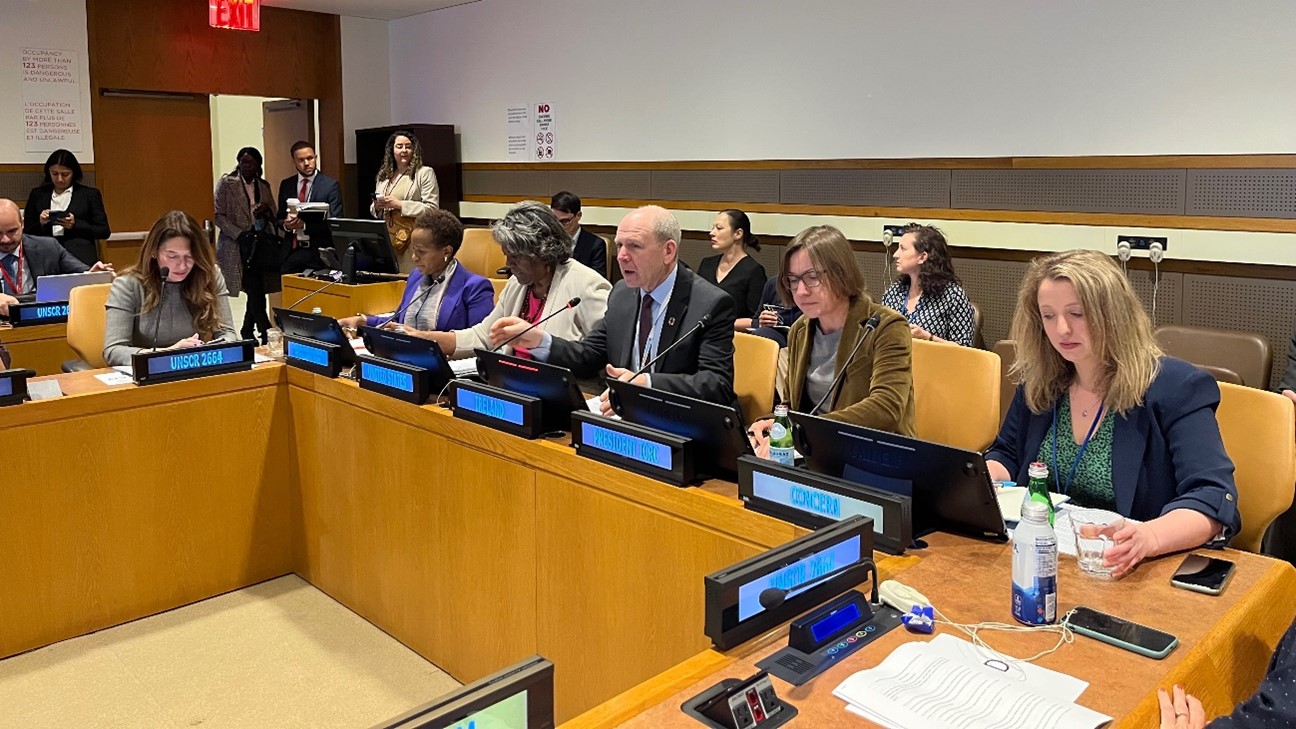
Side-Event on Humanitarian Carve Outs for UN Sanctions Regimes
World Health Organization – May 2023
The World Health Organization is the United Nations agency working to promote health, keep the world safe and serve the vulnerable.
- The seventy-sixth World Health Assembly took place from 21 - 30 May 2023. The Assembly agreed on the first-ever global strategy on infection prevention and control (IPC), which provides Member States with strategic direction to substantially reduce the ongoing risk of health care-associated infections (HAIs), including those that exhibit antimicrobial resistance. The Assembly also approved an unprecedented resolution on the health of Indigenous Peoples, which requests the Director-General to develop a global action plan for the health of indigenous peoples and to present it to the Seventy-ninth World Health Assembly in 2026.
The Organisation for the Prohibition of Chemical Weapons – May 2023
The Organisation for the Prohibition of Chemical Weapons is an intergovernmental organisation and the implementing body for the Chemical Weapons Convention, which entered into force on 29 April 1997.
- Ireland is currently a member of the Executive Council of the OPCW, which consists of 41 OPCW Member States that are elected by the Conference of the States Parties and rotate every two years. Ireland is a longstanding supporter of the OPCW in its vital role in the global prohibition of chemical weapons and works with the international community to prevent impunity seeking accountability for perpetrators of chemical weapons attacks. Ireland’s ambassador to the Netherlands and Permanent Representative to the OPCW and the ICC, H.E. Brendan Rogers, attended the Fifth Review Conference of the Chemical Weapons Convention (CWC) in May 2023. The Conference occurs once every five years and is an opportunity for all States Parties to review the operations of the Chemical Weapons Convention and set a strategic direction for the OPCW for the next five years and beyond. Ireland regretted that the 2023 Conference ended on 19 May 2023 without adopting a final document by consensus due to opposition from the Russian Federation. “Once again, a small number of States demonstrated disregard for multilateral negotiations and refused to compromise”.
United Nations Security Council – May 2023
The United Nations Security Council is one of the six principal organs of the United Nations and hold the primary responsibility for maintaining international peace and security.
- For the first time in its history, Switzerland assumed the Presidency of the UN Security Council in May 2023. The Swiss priorities included promoting sustainable peace, protecting civilians, strengthening international humanitarian law, and countering the impact of climate change on security and peace policy. The Council Presidency hosted two open debates during May, one on “Peacebuilding and Sustaining Peace: Futureproofing Trust for Sustaining Peace” and the other on “The Protection of Civilians in Armed Conflict”.
- On 23 May 2023, H.E. Fergal Mythen, Ireland’s Permanent Representative to the UN, addressed the UN Security Council on behalf of the Group of Friends of Action on Conflict and Hunger during Protection of Civilians week. He said that the Council must rely on timely information about the driving factors of hunger, including through ‘White Notes’ produced by the Office for the Coordination of Humanitarian Affairs and the regular reports of WFP and FAO. In addition to welcoming the extension of the Black Sea Grain Initiative, he called for steps to ensure accountability for attacks against civilian targets.
Speaking in his national capacity, he outlined that the protection of civilians means there is an obligation to protect the objects indispensable to their survival, such as food, water and sanitation systems.Destroying those systems disrupts basic human needs and essential services.To reverse this, Ireland led negotiations on the landmark Political Declaration on Strengthening the Protection of Civilians from the Humanitarian Consequences Arising from the Use of Explosive Weapons in Populated Areas (EWIPA), which was adopted in Dublin in November 2022. H.E. Mythen called on all States to join the EWPIA Political Declaration.
The General Assembly of the United Nations – May 2023
The UN General Assembly (UNGA) is the main policy-making organ of the Organisation. Comprising all Member States, it provides a unique forum for multilateral discussion of the full spectrum of international issues covered by the Charter of the United Nations.
- On 23 May 2023, Ireland’s Permanent Mission to the UN in New York, alongside the Committee to Protect Journalists and the Permanent Mission of Ukraine to the UN, launched an exhibition of the work of the late Ukrainian photojournalist, Maks Levin, who was killed near Kyiv on 13 March 2022. The exhibition was entitled, ‘Journalists are not a target’ and highlighted the reality that civilians bear the brunt of conflict.
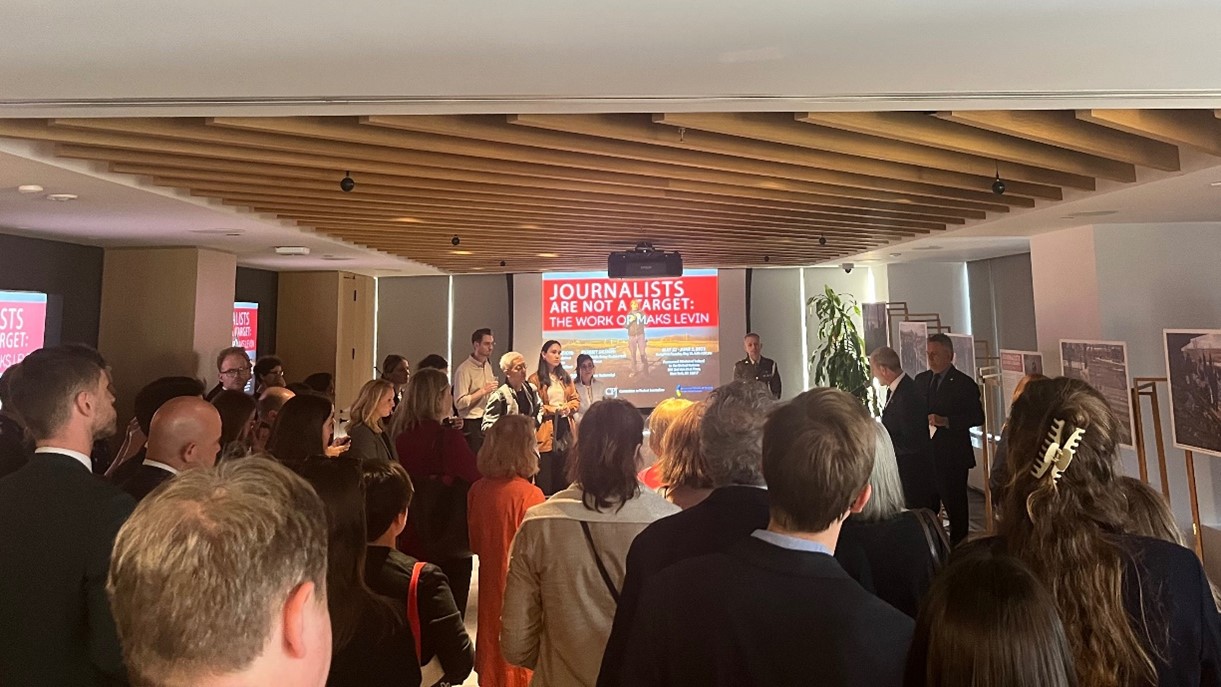
Exhibition of the work of late Ukrainian photojournalist, Maks Levin, entitled ‘Journalists are not a target’.
- On 25 May 2023, just several days before the International Day of UN Peacekeepers, Irish Peacekeeper, Private Seán Rooney, was posthumously awarded the UN's Dag Hammarskjöld medal. The Dag Hammarskjöld medal is a posthumous award given by the United Nations to military personnel, police, or civilians who lose their lives while serving in a United Nations peacekeeping operation. António Guterres, Secretary-General of the United Nations, said in his opening remarks at the medal ceremony that peacekeepers represent the "beating heart of the United Nations' commitment to peace”.
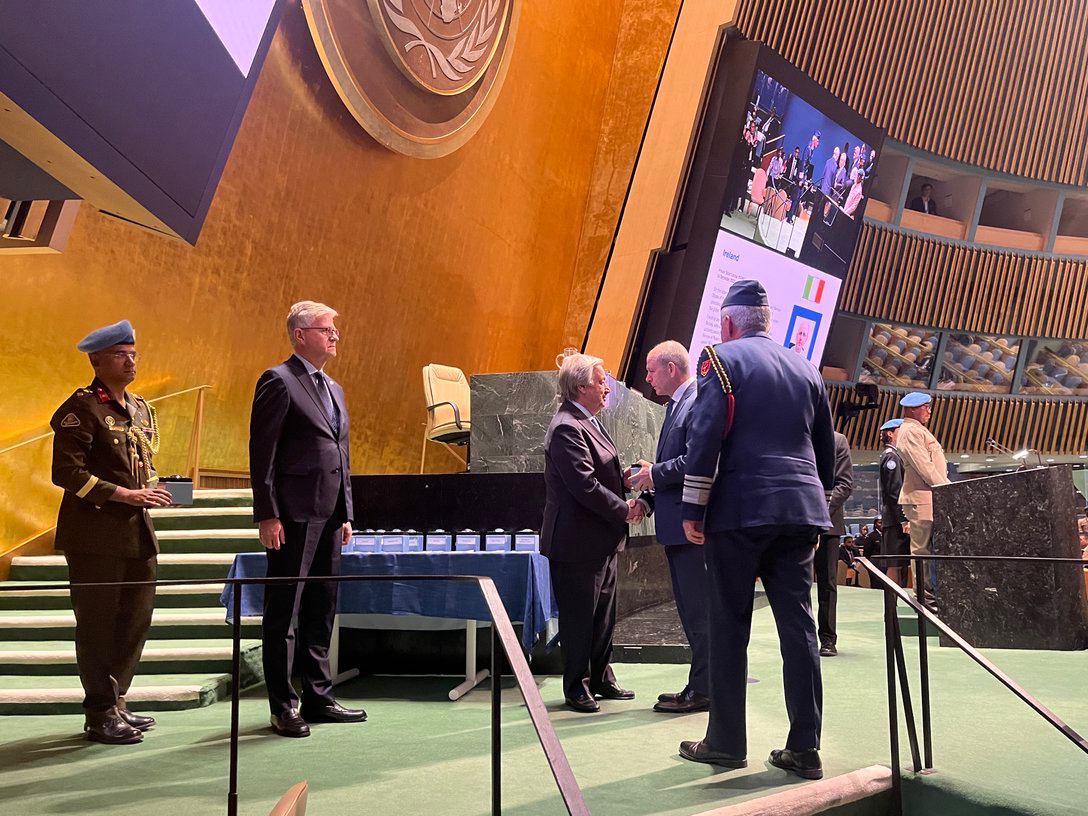
Fergal Mythen accepted the Dag Hammarskjöld medal on behalf of the family of Private Rooney
United Nations Human Rights Council – May 2023
The Human Rights Council is an inter-governmental body within the United Nations system made up of 47 States responsible for the promotion and protection of all human rights around the globe.
- From 1 May to 12 May 2023, fourteen States had their human rights records examined during the 43rd session of the United Nations Human Rights Council’s Universal Periodic Review Working Group. The group of States to be reviewed by the UPR Working Group during this session were (in order of scheduled review): France, Tonga, Romania, Mali, Botswana, the Bahamas, Burundi, Luxembourg, Barbados, Montenegro, the United Arab Emirates, Israel, Liechtenstein and Serbia. The final outcome of the 43rd session will be adopted by the plenary of the Human Rights Council at its 54th regular session taking place in September/October 2023.
The Sustainable Development Goals – May 2023
The 2030 Agenda for Sustainable Development, adopted by all UN Member States in 2015, provides a shared blueprint for peace and prosperity for people and the planet, now and into the future. At its heart are the 17 Sustainable Development Goals (SDGs), which are an urgent call for action by all countries - developed and developing - in a global partnership.
- On 16 May 2023, co-facilitators for consultations on the Political Declaration of the SDG Summit – the Permanent Representatives of Ireland, H.E. Fergal Mythen, and Qatar, H.E. Sheika Alya Ahmed bin Saif Al-Thani, chaired informal consultations on the Zero Draft of the Political Declaration. In a letter accompanying the draft Declaration, the co-facilitators expressed hope that the zero draft “will serve as a sound springboard” for further work towards “an ambitious, impactful, and consensual political declaration.” On 7 June 2023, a virtual informal Stakeholder Dialogue will be hosted by DESA and the UN SDG Action campaign to provide an opportunity for major groups and other stakeholder to share inputs into the Zero Draft Political Declaration for the SDG summit in September 2023.
April 2023
This month’s review includes updates from an Irish perspective on key developments at the UN General Assembly, the Security Council, the UN Economic and Social Council, and the Human Rights Council.
The Mandate of the Office of the UN Special Rapporteur on the situation of human rights defenders is renewed.
On 3 April 2023, the UN Human Rights Council in Geneva renewed the mandate of the UN Special Rapporteur on the situation of human rights defenders. Irish woman, Mary Lawlor, is the current mandate holder and was first appointed to this post in May 2020. Previously, Mary Lawlor was the founder of Human Rights Defenders, the international foundation to protect human rights defenders at risk. This is the sixth time that the UN Human Rights Council has extended the mandate of the Special Rapporteur. The Special Rapporteur is mandated to raise individual cases in which human rights defenders have been subjected to threats, harassment or reprisals with the authorities in countries where these actions are happening. The Special Rapporteur also presents thematic reports which outline the current trends and challenges that human rights defenders are facing and illustrates the achievements of human rights defenders.
Mary Lawlor was the founder of Human Rights Defenders, the international foundation to protect human rights defenders at risk. In a recent statement she said, “Human rights defenders are often victims of their own success, targeted because they confront powerful vested interests, because they expose corruption, because they refuse to accept injustice, because they challenge criminal gangs, because they talk about things governments want to hide, because they tell the truth, and because they make good things happen,” she emphasised that, “States can and should do more to protect defenders.
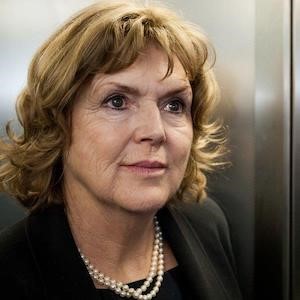
Mary Lawlor, UN Special Rapporteur on the situation of human rights defenders
United Nations Economic and Social Council – April 2023
The United Nations Economic and Social Council is one of the six principal organs of the United Nations, responsible for coordinating the economic and social fields of the organisation.
- On 5 April 2023, Ireland was elected by the Economic and Social Council to the Executive Board of the United Nations Children’s Fund (UNICEF) for the term beginning on 1 January 2024 and expiring on 31 December 2024. The Executive Board is the governing body of UNICEF, providing intergovernmental support and oversight to the organisation, in accordance with the overall policy guidance of the United Nations General Assembly and the Economic and Social Council.
- The twenty-second session of the United Nations Permanent Forum on Indigenous Issues (UNPFII) took place from 17-28 April 2023. The theme for this year’s session, ‘Indigenous Peoples, human health, planetary and territorial health, and climate change: a rights-based approach’, holds particular relevance for the implementation of the Sustainable Development Goals (SDGs), as it emphasises the connections between human health and the health of the planet. During the session, UN Secretary-General, António Guterres, acknowledged that indigenous peoples ‘hold many of the solutions to the climate crisis and are guardians of the world’s biodiversity’. The President of the General Assembly, Csaba Kőrösi, declared that the world is still paying the price for taking such a long time to learn from indigenous peoples, about the ways in which the health of the planet and the health of people are intrinsically linked.
- The Economic and Social Council (ECOSOC) Youth Forum took place from 25 to 27 April 2023. One of Ireland’s UN Youth Delegates, David Giles, spoke at a thematic session of the Forum on amplifying youth voices for a sustainable urban future. David underlined the need to mobilise youth in creating inclusive, sustainable urban solutions as part of the 2030 agenda.
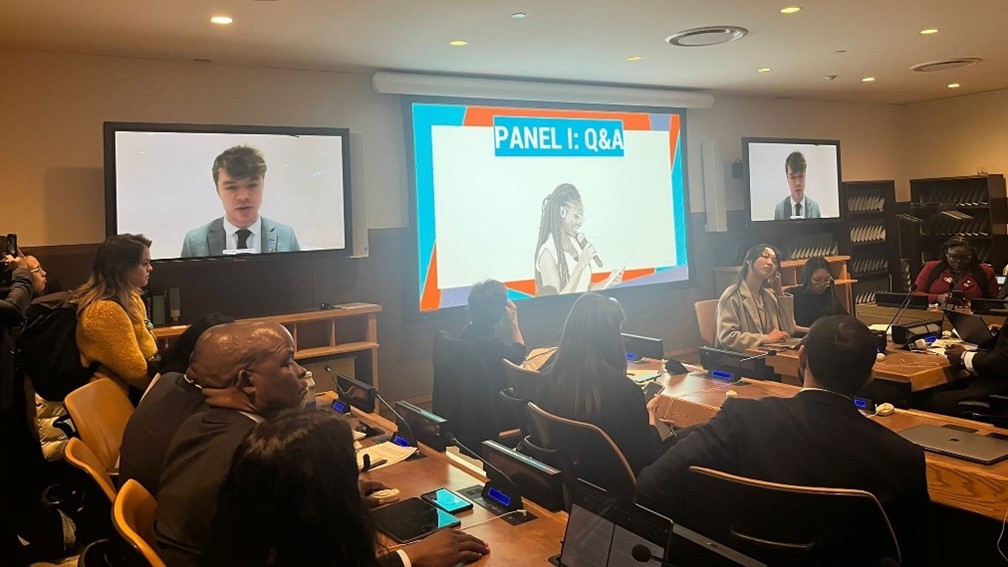
Ireland’s UN Youth Delegate, David Giles, speaking remotely at the UN Economic and Social Council Youth Forum
United Nations Security Council – April 2023
The United Nations Security Council is one of the six principal organs of the United Nations and hold the primary responsibility for maintaining international peace and security.
- The Russian Federation took over the rotating Presidency of the Security Council for the month of April, during which it held a signature event on ‘risks stemming from violations of the agreements regulating the export of weapons and military equipment’. The Security Council also held two other debates, one on effective multilateralism through the defence of the principles of the Charter of the United Nations, and another on the Middle East – which focused on the stagnation of the Palestinian-Israeli conflict resolution and the escalation of tensions.
- Responding to critics who have questioned the Russian Federation’s credibility to preside over the Council, Russia's Ambassador to the UN, Vasily Nebenzia, said that “some countries are pretending they can decide at their own will who they want or do not want” as President of Security Council. Citing the rules of procedure, he underlined that the order for the rotation of the presidency is well defined and cannot be changed.
The General Assembly of the United Nations – April 2023
The UN General Assembly (UNGA) is the main policy-making organ of the Organisation. Comprising all Member States, it provides a unique forum for multilateral discussion of the full spectrum of international issues covered by the Charter of the United Nations.
- On 26 April 2023, the General Assembly held its first ever formal debate on the use of the veto in the Security Council. Speakers deliberated on the impact of UN resolution 76/262, entitled ‘Standing mandate for a General Assembly debate when a veto is cast in the Security Council’, which was adopted in April 2022. The resolution was adopted by the General Assembly as a transparency and accountability mechanism and provides for the General Assembly to be convened by its President, within ten working days of the casting of a veto by any of the Permanent Members of the Security Council. The purpose of this meeting would be to hold a debate on the situation as to why the veto was cast.
- On 26 April 2023, the UN General Assembly adopted a resolution that will increase and protect cooperation between the UN and the Council of Europe. Draft resolution L.65 was adopted with 122 votes in favour to 5 against (Belarus, the Democratic People’s Republic of Korea, Nicaragua, the Russian Federation and Syria), and 18 abstentions. Ireland and Iceland were co-penholders as the former and current Presidency of the Council of Europe Committee of Ministers.
- Tánaiste and Minister for Foreign Affairs and Minister for Defence, Michéal Martin, warmly welcomed the adoption and underlined that Ireland, during its Presidency of the Council of Europe last year, actively worked to uphold and promote its core values of democracy, human rights and the rule of law. He emphasised that while Ireland and Iceland aimed to conduct inclusive negotiations, challenges were anticipated in the aftermath of the expulsion of the Russian Federation from the Council of Europe last year.
- Speaking in an explanation of position before the vote, the Russian Federation, expressed that it could not support the draft resolution in its current form because of paragraph 9 of the preamble of the resolution, and criticised its inclusion as being ‘highly politicised in nature’.
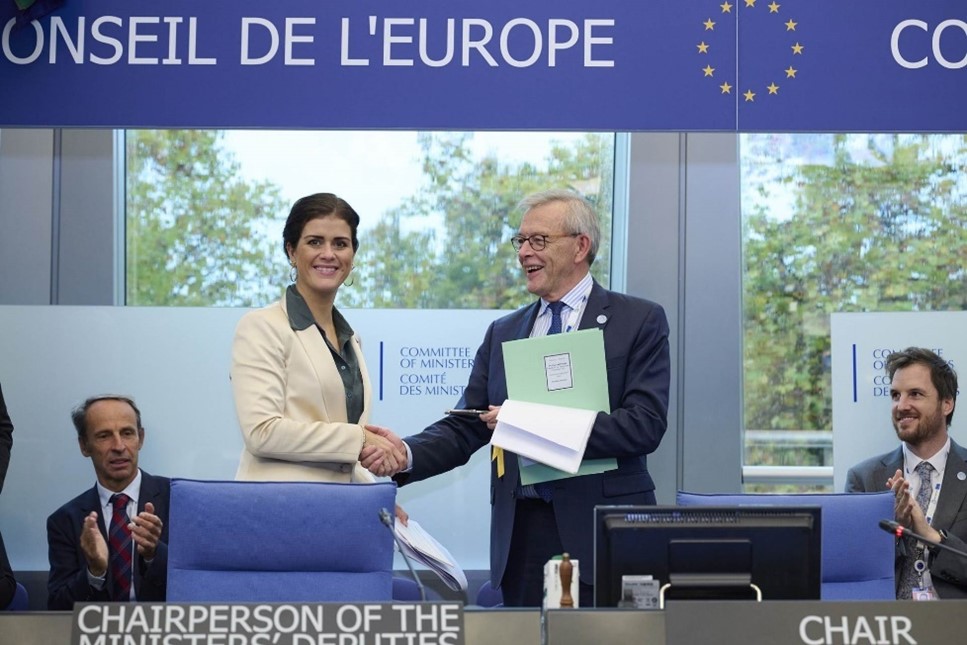
Thórdís Kolbrún Reykfjörd Gylfadóttir, Minister for Foreign Affairs of Iceland, and Breifne O’Reilly, Ireland's Permanent Representative to the Council of Europe as Ireland handed the Presidency over to Iceland in November 2022
- During the debate, Ireland’s Deputy Permanent Representative to the United Nations, Martin Gallagher, said that the use of the veto undermines the Council’s credibility and legitimacy from within. He said that over the past year, the veto was used four times to block Council action on issues including the authorisation of life-saving cross-border aid in Syria and the continued proliferation of illegal, provocative missile-related activities in the Democratic People’s Republic of Korea. Further to this, the Russian Federation has twice utilised the veto power to evade accountability since launching its illegal, full-scale invasion of Ukraine in 2022. Ireland underlined that “reform of the veto power is overdue”.
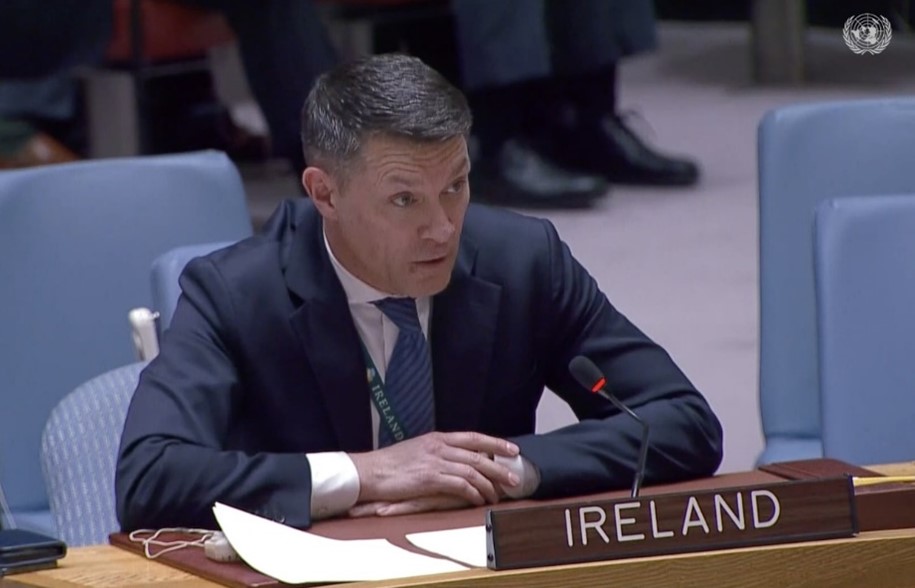
Ireland’s Deputy Permanent Representative to the United Nations, Ambassador Martin Gallagher
The Sustainable Development Goals – April 2023
The 2030 Agenda for Sustainable Development, which was co-facilitated by Ireland and Kenya, and adopted by all UN Member States in 2015, provides a shared blueprint for peace and prosperity for people and the planet, now and into the future. At its heart are the 17 Sustainable Development Goals (SDGs), which are an urgent call for action by all countries - developed and developing - in a global partnership.
- On 25 April 2023, UN Secretary-General, António Guterres, launched a special edition of the Sustainable Development Goals (SDGs) progress report. The report has been launched in advance of the SDG Summit, during which world leaders will gather at the UN in September 2023. The outcome report of the SDG Summit will be co-facilitated by Ireland and Qatar. The SDG Progress Report shows that just 12 per cent of the Sustainable Development Goal targets are on track, progress on 50 per cent is weak and insufficient and progress on more than 30 per cent of the SDGs have stalled or gone into reverse since the COVID-19 pandemic.
- The report includes five important recommendations. First, it calls for all Member States to recommit to action to achieve the SDGs at national and international levels between now and 2030. Second, it urges Governments to set and deliver on ambitious national benchmarks to reduce poverty and inequality by 2027 and by 2030. Third, the report calls for a commitment from all countries to end the war on nature. Fourth, it calls on Governments to strengthen national institutions and accountability. And fifth, it calls for greater multilateral support for the United Nations development system and decisive action at the 2024 Summit of the Future.
March 2023
This month’s review includes updates from an Irish perspective on key developments at the UN General Assembly, the Commission on the Status of Women, the LDC conference in Doha, the UN Water Conference, the Security Council, and it highlights the landmark agreement by the EU to extend humanitarian exemptions in sanctions regimes.
A Step Forward for Climate Justice
In a historic victory for climate justice, UN Member States agreed by consensus to refer an advisory opinion to the ICJ regarding climate change. The International Court of Justice, which is based in The Hague is responsible for settling international legal disputes submitted to it by States and to give advisory opinions on legal questions referred to it by authorised United Nations organs and specialised agencies. The resolution was co-sponsored by over 120 countries, including Ireland.
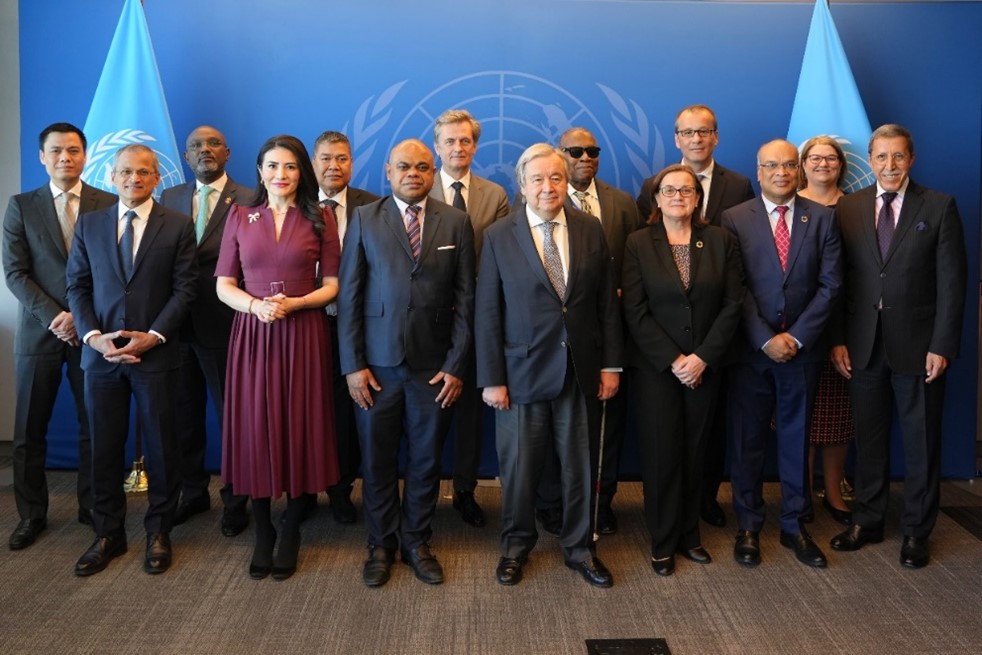
The Permanent Mission of the Republic of Vanuatu to the United Nations with UN Secretary General António Guterres
The year-long campaign which resulted in this resolution was spearheaded by Vanuatu, a tiny Pacific island nation which is extremely vulnerable to extreme climate effects. Vanuatu is not only one of the least polluting countries in the world but also a carbon-negative country, which means that it actually absorbs more emissions than it produces.
By requesting an advisory opinion from the ICJ, the General Assembly is seeking clarification on the rights and obligations of States under international law to ensure that all countries, including small island developing States and other climate vulnerable States, have a right to a healthy and sustainable environment; due diligence and accountability mechanisms for emitters of greenhouse gases; and the implications on the human rights of present and future generations.
In introducing the text to the General Assembly, the Prime Minister of the Republic of Vanuatu, Alatoi Ishmael Kalsakau, paid homage to the “important role of the young law students in the Pacific who inspired this initiative and who brought this to the attention of the Vanuatu government in 2019.” Solomon Yeo and 26 of his classmates, who all hailed from Pacific island countries and were studying at the University of South Pacific in Vanuatu, championed the idea of the resolution with local government leaders and took their campaign from the Pacific to the United Nations in New York.
United Nations Secretary-General, António Guterres, said that “such an opinion would assist the General Assembly, the UN and Member States to take the bolder and stronger climate action that our world so desperately needs.”
Upon formal adoption, the General Assembly will communicate the request for an advisory opinion to the ICJ in written form, with specific legal questions that the court is being asked to decide. The ICJ has discretionary power to decline to give an advisory opinion even if the conditions of jurisdiction are met. It is worth noting however that the ICJ has never, in the exercise of this power, declined to respond to a request for an advisory opinion from the UN General Assembly.
While ICJ advisory opinions have no binding force in domestic courts, they carry great legal weight and moral authority. New legal clarity could bring momentum into the climate negotiations and could encourage countries to make more ambitious pledges for action against climate change. Furthermore, it could provide much needed clarification the legal obligations of States to prevent and redress the adverse effects of climate change, as well as potential legal consequences for States where they, by their acts and omissions, have caused significant harm to the climate system.
This is not the first attempt to request an advisory opinion on climate change from the ICJ. In 2011, Palau and the Marshall Islands called on the UN General Assembly to seek an advisory opinion from the ICJ on the responsibilities of States under international law to ensure that activities carried out under their jurisdiction of control that emit greenhouse gases (GHGs) do not damage other States. The initiative was unsuccessful at the time due to strong political opposition. The 2023 resolution signals not only a shift in political will, but the overwhelming support for Vanuatu's initiative also signifies the urgency with which the international community must act to combat climate change.
At a time when the world is at a crossroads, the tiny island nation of Vanuatu has made a giant step not only for the international community at large, but also for future generations.
The Office of the High Representative for the Least Developed Countries, Landlocked Developing Countries and Small Island Developing States (UN-OHRLLS) – March 2023
UN-OHRLLS was established in 2001 to advocate for three vulnerable country groups, Least Developed Countries (LDCs), Landlocked Developing Countries (LLDCs) and Small Island Developing States (SIDS).
- The 5th United Nations Conference on the Least Developed Countries (LDC5) took place in Doha, Qatar, from 5 to 9 March 2023. During LDC5, world leaders adopted a Political Declaration that welcomed the Doha Programme of Action for the Least Developed Countries for the Decade 2022-2031.
Rabab Fatima, Secretary General of the Conference, said that two words repeatedly uttered in Doha stood out above all others – “partnership” and “graduation”. The international community, she said, must make sustainable graduation a reality for all LDC’s, calling for more meaningful partnership towards that end.
Ireland’s representative, Áine Hearns, from the Department of Foreign Affairs, reiterated Ireland’s commitment to the LDCs and reaffirmed that this central commitment informs not only the geography of Ireland’s work, but its focus – in gender equality, global health, education and across the interconnected SDGs. These themes are likely to be addressed at the SDG Summit 2023 in New York and at the Summit of the Future in 2024.
United Nations Economic and Social Council – March 2023
The United Nations Economic and Social Council is one of the six principal organs of the United Nations, responsible for coordinating the economic and social fields of the organisation.
- The Commission on the Status of Women is the most important annual global forum dedicated to advancing gender equality, which takes place at the UN in New York. The 67th session took place from 6 March 2023 – 17 March 2023, on the theme of “innovation and technological change, and education in the digital age for achieving gender equality and the empowerment of all women and girls.” Member States agreed conclusions which call on States to take certain actions: including providing funding for inclusive digital transformation to achieve gender equality and the empowerment of all women and girls; fostering gender-responsive digital education and promoting the equal participation, leadership, and employment of women in technology and innovation. Ms. Sima Bahous, UN Under-Secretary-General and Executive Director of UN Women, delivered the closing statement of the session and stated that participants of CSW “have set the global normative framework on gender equality, technology and innovation that will shape the lives of women and girls right across the world.”
- During CSW67, the Irish Consortium on Gender Based Violence (ICGBV) and Ireland's Permanent Mission to the UN in New York, co-hosted a side event on technology-facilitated gender-based violence. During the event the ICGBV presented its policy paper on the intersection of technology and gender-based violence, which explores how technology has exacerbated the epidemic of violence against women and girls, but also examines opportunities in the areas of prevention, mitigation and response in humanitarian and development contexts.
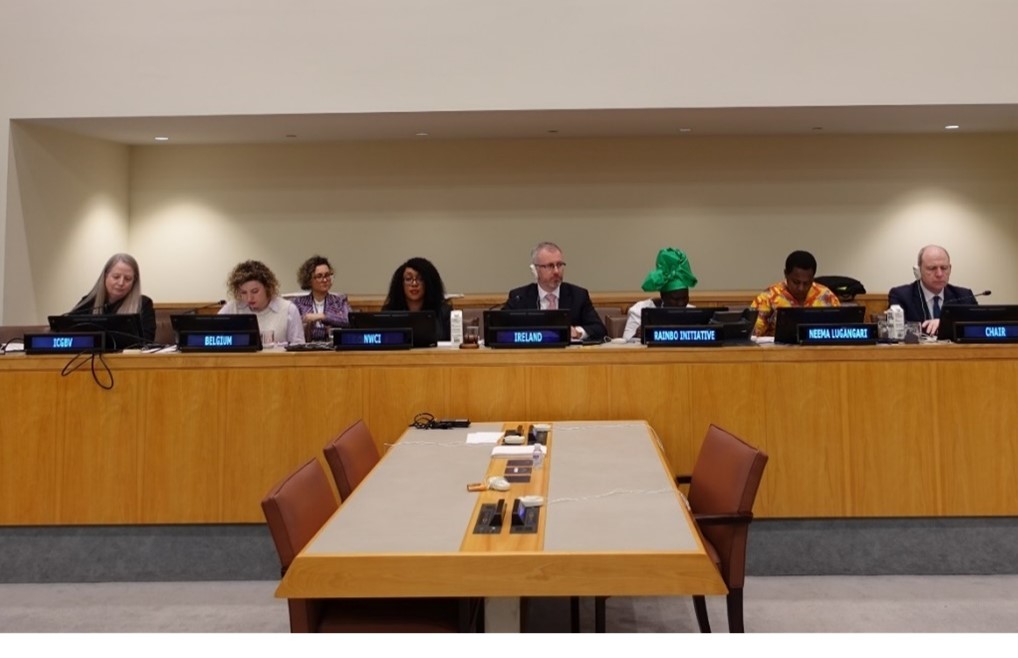 Minister Roderic O’Gorman and Ambassador Fergal Mythen Participating in Ireland’s Side Event. The United Nations Security Council is one of the six principal organs of the United Nations and hold the primary responsibility for maintaining international peace and security.
Minister Roderic O’Gorman and Ambassador Fergal Mythen Participating in Ireland’s Side Event. The United Nations Security Council is one of the six principal organs of the United Nations and hold the primary responsibility for maintaining international peace and security.
- In March 2023, Mozambique held its first ever Presidency of the United Nations Security Council. Mozambique held two open debates, one on 7 March on the theme of Women, Peace and Security during which more than 90 speakers took the floor over the day-long meeting, emphasizing the challenges faced by women in the world’s increasingly complex conflict zones. Ireland’s Minister for Children, Equality, Disability, Integration and Youth, Roderic O’Gorman, delivered Ireland’s statement and spoke of Ireland's efforts during its 2021-2022 term as an elected member of the Security Council to put WPS at the heart of its work across all of the Council's files, and reiterated the urgent need to fight back against the pushback on gender equality that has been gaining momentum around the world.
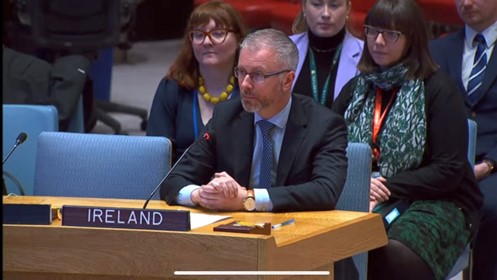
Minister Roderic O’Gorman speaking at the Open Debate on Women, Peace and Security
- Mozambique’s second open debate was held on 30 March which discussed peace and security in Africa and focused on the impact of development policies in the implementation of the Silencing the Guns agenda, speakers in the Council emphasized the need for greater international cooperation and support for “African solutions to African problems”. Mozambique held its signature event on 28 March on the theme of countering terrorism and preventing violent extremism by strengthening cooperation between the United Nations and regional organisations and mechanisms.
- During the month of March, the Security Council unanimously adopted two resolutions concerning Afghanistan, one of which extended the mandate of the United Nations special political mission for one year, while the other requests an independent assessment of, and recommendations for, efforts to address the country’s current challenges.
UN-Water – March 2023
UN-Water coordinates the efforts of United Nations entities and international organizations working on water and sanitation issues. UN-Water’s work focuses on enabling data-driven acceleration and coordination to achieve SDG 6 and other international water-related commitments.
- The UN 2023 Water Conference, the first UN Water Conference in a generation, took place at UN Headquarters in New York, 22-24 March 2023, and was co-hosted by Tajikistan and the Netherlands. The ambition of the Water Conference was to reach agreement of a "water action agenda" to coordinate the voluntary commitments of member states and the private sector into a concrete framework. Progress on water-related goals and targets have remained off track, jeopardising the entire Sustainable Development agenda. To counter this individual member states pledged financial commitments to building water and sanitation infrastructure, including an announcement of $49bn by the United States.
- Speaking on World Water Day, the President of Ireland, Michael D. Higgins, described the vital importance of clean water and sanitation for our health, our environment and our planet’s future. He concluded by identifying the great global challenge to create a world where every person has access to safe and clean water and adequate sanitation, where our shared resources are protected from pollution, overuse and climate change and valued for the benefit of all.
European Council – March 2023
- On 31 March 2023, the EU announced that it was introducing humanitarian exemptions to eight EU sanction regimes. This move follows the UN Security Council resolution 2664 (2022), which ensures that humanitarian assistance is not impeded by targeted sanction regimes and that measures are in place to provide access to frozen assets in those regimes.
During Ireland’s term as an elected member of the UN Security Council, Ireland, together with the US, initiated and led negotiations on this landmark resolution, which will help to ensure that crucial humanitarian assistance can be delivered to parts of the world, even where sanctions are in place.
Tánaiste and Minister for Foreign Affairs, Michael Martin, T.D., said Ireland has taken a leading role in Brussels in ensuring that humanitarian exemptions negotiated for UN sanctions regimes are also reflected in EU sanctions regimes.
Ireland and the UN - February 2023
Historic Moment - UN Treaty to Protect High Seas Agreed After Almost Two Decades of Negotiations at the United Nations HQ in New York.
“Ladies and Gentlemen, the ship has reached the shore” – with these words, Rena Lee, Singapore’s ambassador for the oceans, and chair of the Intergovernmental Conference on Marine Biodiversity of Areas Beyond National Jurisdiction, announced the successful conclusion of negotiations on an international legally binding treaty to protect oceans that lie outside national boundaries.
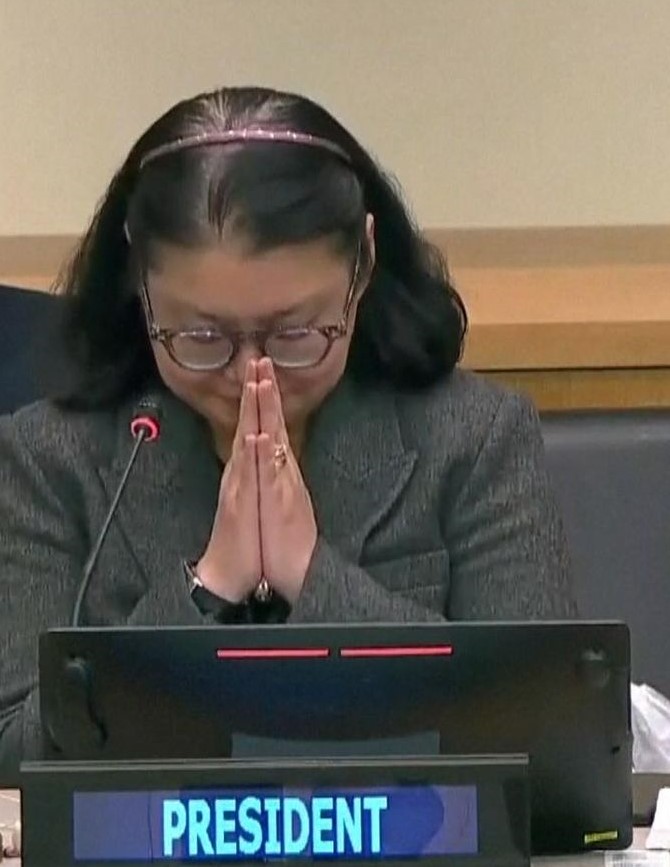
Rena Lee, Singapore's Ambassador for Oceans and Law of the Sea Issues and chair of the Intergovernmental Conference on Marine Biodiversity of Areas Beyond National Jurisdiction
On 20 February 2023 the Intergovernmental Conference to draft a new maritime biodiversity treaty resumed its fifth session, which began under the auspices of the United Nations back in 2004. The agreement is the first international treaty for the protection of the oceans, since the UN Convention on the Law of the Sea, (UNCLOS), which was adopted in 1982 and which predated the now well-established concept of marine biodiversity.
Finally, on 5 March 2023, delegates agreed the text for this historic treaty which is crucial for enforcing the 30x30 pledge made by countries at the UN biodiversity conference in December 2022 in Montreal, to preserve a thirty percent of the sea by 2030. Efforts to create a legal framework which would protect marine life in the regions outside national boundary waters, known as “the high seas”, and ensure the conservation and sustainable use of marine biological diversity, have been repeatedly stalled over the last 20 years. The importance of protecting large areas of the high seas is that when they remain undisturbed, they continue to lock away carbon from the atmosphere into the seabed thus mitigating the worst impacts of climate change.
At present, it is estimated that only 1.2% of the high seas are protected. Prior to this agreement, all countries had the right to navigate, fish and conduct research on more than 60% of the high seas. So, the stakes were high for these negotiations, as they dealt with contentious and lucrative fishing rights, shipping rights, proposals for deep sea mining and harvesting compounds from marine sources which could have implications for the pharmaceutical industry. In the final days of the negotiations, attention had focused on who would benefit from marine resources and how developing nations could be supported so that they could meet their treaty commitments. It was agreed that access to new discoveries, including Marine Genetic Resources (MGR) should be shared equally and fairly throughout the globe.
The agreement was warmly welcomed by Ireland’s Permanent Representative to the UN, Fergal Mythen, who congratulated Carl Grainger (DFA) and Richard Cronin (Department of Housing) Ireland’s representatives at negotiations in New York. They were part of the EU team, which over the past six years, has taken the lead in driving the process. Richard Cronin commented that forthcoming national legislation on marine protected areas in national waters will complement the agreement on protection of international waters.
The new treaty consists of four parts:
- rules for marine protection areas,
- requirements for environmental impact assessments for deep-sea activities,
- standards for access to and use of marine genetic resources, and
- tools to manage capacity-building and technology transfer.
The treaty will also establish a governing body that will meet periodically and hold member states accountable on issues such as governance and biodiversity. The agreement will be formally adopted at a later UN session, once it has been reviewed by lawyers and translated into the United Nations’ six official languages.
Ireland’s President Michael D. Higgins described the agreement on a High Seas Treaty as a “gain for the future of humanity” and commented that “UN Sustainable Development Goal 14 commits to conserving and sustainably using the oceans, seas and marine resources for sustainable development and this agreement will make a significant contribution to that goal”. In a year where Ireland is acting as co-facilitator, alongside Qatar, for the review document of the SDGs, this agreement is a significant milestone. It has been hailed by others as a signal that multilateralism still works in an increasingly divided world.
The General Assembly of the United Nations – February 2023
The UN General Assembly (UNGA) is the main policy-making organ of the Organisation. Comprising all Member States, it provides a unique forum for multilateral discussion of the full spectrum of international issues covered by the Charter of the United Nations.
- On 6 February 2023, UN Secretary-General, António Guterres, outlined the priorities of the United Nations for 2023 in a speech before the General Assembly.
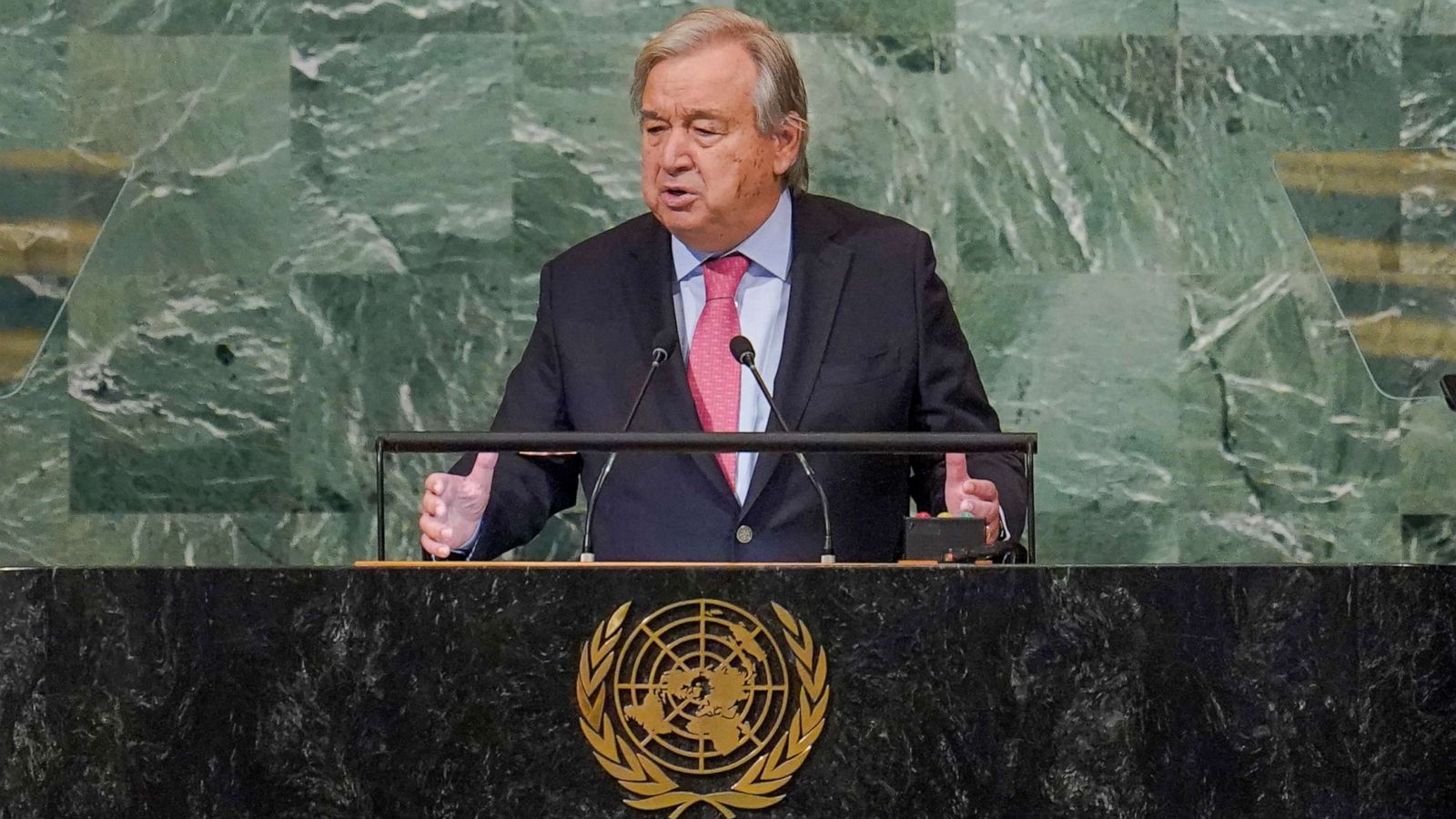
António Guterres, Secretary-General of the United Nations
“The New Agenda for Peace”
The Secretary-General outlined the core elements in the New Agenda for Peace noting the plight of two billion people living in countries affected by conflict and humanitarian crises.Addressing how under-resourced UN peacekeeping missions are, he announced that the UN will increase its commitment to reform through the Action for Peacekeeping+ initiative with the AU as a partner.
“A New Bretton Woods Moment”
Turning to poverty, he called for radical transformation in the global financial architecture and urged global commitment to place the needs of developing countries at the centre of the global financial system. He called on multilateral development banks to change their business model and accept a new approach to risk and encouraged greater flows of private investment capital to achieve the SDGs.
“SDG Summit in September 2023 – a Centrepiece Moment for 2023”
He drew attention to two key dates in the 2023 calendar which offer an opportunity to rescue the SDGs, the LDC5 conference from 5 - 9 March and the SDG summit from 19 - 20 September, which he described as the centrepiece moment of 2023, and which will be co-facilitated by Ireland and Qatar.
“A Year of Reckoning”
On climate, he warned that the world is at immediate risk of hurtling past the 1.5ºC temperature increase limit and is moving towards a deadly 2.8ºC. He emphasised that developed countries must make good on the $100 billion promised to developing countries, deliver on the “loss and damage fund” agreed in Sharm El-Sheikh and double adaptation funding.
“Human Rights and Dignity for All.”
Shedding light on the state of human rights worldwide, he pointed out that vulnerable minority communities are increasingly targeted for hate, online and off.On gender equality, he stated that he has commissioned an independent review of the United Nations capacity around gender equality across all pillars of its work.
- Other developments in the General Assembly: During February, the General Assembly adopted five consensus resolutions, one on Africa’s development; one addressing durable peace across the continent; one on sustainable development; one on global health and one on cooperation between the United Nations and the Organisation for the Prohibition of Chemical Weapons.
United Nations Security Council – February 2023
The United Nations Security Council is one of the six principal organs of the United Nations and hold the primary responsibility for maintaining international peace and security.
- In February 2023, Malta, one of the newly elected E10 countries on the Security Council, held its month-long Presidency of the Security Council. Malta held two signature events during its Presidency. The first was a briefing which took place on 13 February 2022, discussing Children and Armed Conflict, with a focus on prevention as nearly 24,000 grave violations committed against children were verified by the UN in 2021. The second signature event of Malta’s Presidency, a High-Level debate on sea-level rise, took place on 14 February 2023. António Guterres, Secretary-General of the United Nations, stressed to the Council the need to provide developing countries with the resources to build resilience against climate disaster.
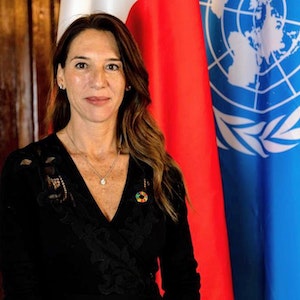
H.E. Vanessa Frazier, Permanent Representative of Malta to the United Nations
- Yemen: On 15 February 2023, the Security Council unanimously adopted resolution 2675 (2023) renewing for nine months a travel ban and assets freeze imposed on specific individuals and entities in Yemen, while extending for ten months the mandate of the Panel of Experts tasked with assisting their Yemen sanctions committee.
- Ukraine: On 24 February 2023, on the one-year anniversary of Russia’s illegal invasion of Ukraine, the Security Council held a meeting on Ukraine. United Nations Secretary-General, Antonio Guterres, reported that 17.6 million people — 40 per cent of the population — require humanitarian assistance. He also stated that progress has been made under the Black Sea Grain Initiative, reporting that 20 million metric tons of foodstuffs have now been safely reconnected to global supply chains on more than 700 ships, helping to bring down prices around the world.
- Syria: On 28 February 2023, the Security Council held a meeting on Syria. Briefing the Council, Martin Griffiths, Under-Secretary-General for Humanitarian Affairs and Emergency Relief Coordinator, explained that the earthquakes that struck Türkiye and Syria in recent weeks have compounded the suffering of the Syrian population — who have already been plagued by 12 years of unrelenting armed conflict. He added that the 2023 Syria Humanitarian Assistance Response Plan will require $4.8 billion to address pre-existing needs. “This is the largest humanitarian appeal worldwide, reflecting the scale and gravity of needs across Syria.”
United Nations Human Rights Council - Geneva
The Human Rights Council was established in 2006 is an inter-governmental body which is subsidiary to the UN General Assembly and comprises of 47 States, which are responsible for the promotion and protection of all human rights around the world. It holds three regular sessions each year for a total of at least 10 weeks. Sessions usually take place in March (four weeks), June (three weeks) and September (three weeks). If one-third of the Member States requests so, the Human Rights Council can decide at any time to hold a special session to address human rights violations and emergencies.
- On 27 February 2023, the 52nd session of the United Nations Human Rights Council (HRC) opened in the Palais des Nations in Geneva, and it will convene until 4 April 2023. The HRC will discuss country-specific developments and thematic human rights issues such as human rights violations relating to the use of the death penalty, the rights of the child, civil society and the digital environment and combating racism and racial discrimination during this session.

In his address to the Human Rights Council, an Tánaiste and Minister of Foreign Affairs, Micheál Martin, announced that Ireland will seek membership of the Human Rights Council for the period 2027-2029. This is significant because it demonstrates both Ireland’s strong commitment to human rights and the centrality of human rights to Ireland’s foreign policy.
